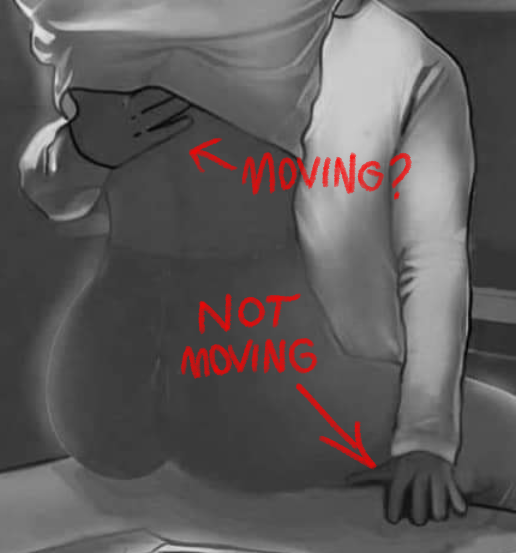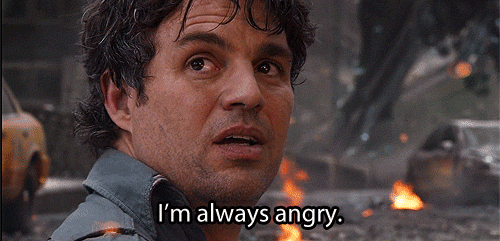Are Christians Kind of Stupid?

Controversial hot-take for my Churchy Smart Friends: are Christians kind of stupid?
Hear me out. I don’t mean “stupid” in terms of intellect, but in terms of curiosity, intellectual rigor, and self-awareness. A perfectly intelligent person can lack these things—in fact, it happens all the time.
And many Christians seem to fall into that category.
Looking around at the modern church—at our worship lyrics (COUGH, sorry, I’ve got a lion in my lungs), at the books we make bestsellers, at the leaders we rally around—I fear a distinct and pervasive trend of… well, stupidity.
Not intellectual weakness, but intellectual abdication.
There are exceptions, of course.
In fact, I am drawing my concept of stupidity from one of Christianity’s greatest thinkers. Dietrich Bonhoeffer wrote much about the concept of willful stupidity.
In a nutshell, Bonhoeffer suggests that stupidity is what happens when one’s faithfulness to an ideology becomes more important than one’s faithfulness to objective truth.
When this happens, all information is put through a filter: does it confirm or undermine my ideology?
If it confirms my ideology, then the information is, by default, true.
If it undermines my ideology, then the information is, by default, false.
The actual truth of the information is secondary, or completely moot. This is why people respond the way they do when someone points out the falsehood of something they posted on Facebook. They aren’t grateful to be spared the embarrassment of posting an untruth. They are angry that someone has dared to undermine their ideology.
And this happens way, WAY too often in the current American church. Dietrich Bonhoeffer would be dismayed, to say the least.
This is less true in some demographics outside the church.
In the “secular” world, there seems to be a renaissance of big-think. Philosophers, economists, and psychologists write bestselling books and present lectures to sell-out crowds. Thinkers like Jordan Peterson, Sam Harris, Malcolm Gladwell, Douglas Murray, and many others attract massive followings. Their books—dense and challenging to a deliberate degree—are devoured by a growing demographic of people hungry for ideas, for intellectual rigor, for challenging concepts and foundational truths.
But in the church? We make bestsellers of things like “Heaven is For Real”, which was clearly dubious from the beginning, and turned out to be completely made up.
We flock in droves to movies like the counter-productively awful “God is Not Dead” (and its cringe-inducing sequels) where atheists are straw-man villains and confirmation bias might as well get an executive producer credit.
We pump out endless “worship” albums with music so inbred and lyrics so nonsensical that no one outside the church would ever force themselves to listen to it.
We elevate pap-peddling superstar pastors and carry water for proven abusers, so long as we find their preaching easy on the ears, or sufficiently affirming of our beliefs.
We are, in short, stupid.
Not unintelligent. Stupid, according to Bonhoeffer’s definition.
We have checked our intellect and put on ignorance as a shield from hard ideas, challenging questions, intellectual rigor, and simple curiosity.
Sadly rare is the curiosity that once drove Christians to explore the sciences, that propelled them to philosophize and plumb the depths of the mind, that fueled some of the biggest thinking of the last thousand years.
This is why most of my favorite thinkers today are atheists, agnostics, or just plain irreligious. And why I find so much Christian media to be empty, unchallenging, simplistic, and frankly, embarrassingly stupid.
I’ve had well-meaning Christian friends tell me it’s dangerous to engage with content produced by unbelievers. As if Christianity is a house of cards subject to collapsing at the slightest oppositional breath, rather than a foundational edifice of truth that has withstood the challenges of the greatest minds (and converted many of them) since antiquity.
But an objection arises. I hear you asking: what about apologetics?
Yes, many Christians are interested in apologetics—the construction of intellectual arguments in support of our faith. This is a good thing, I suppose.
But for most such people, apologetics are merely a form of intellectual cosplay.
Most armchair apologists collect arguments and facts and talking points, but rarely do they seem to fully understand them—much less the ideas they purport to refute.
All too rare is the Christian eager to fully understand—to consider and digest and engage with—any truly honest opposing ideology. They approach discussions with non-believers (almost exclusively in the performative arena of social media) with a jingling bandolier of rebuttals, firing them off verbatim, without legitimately engaging with the other person.
Most apologists are like geese—they’ve eaten a kernel of truth, and they poop it out exactly as it went in, unchanged and undigested.
The second-to-last thing most Christian armchair apologists will ever utter is: “You make a good point.” The LAST thing they will ever utter is an honest “I don’t know.”
The problem is: no one can truly think unless they can concede a good point, or understand an opposing argument well enough to comprehend why people believe it, or admit what they don’t know.
That takes curiosity, and intellectual honesty, and wonder, and humility, and a love of actual, truth.
More, it takes a deep and foundational love of the Truth Giver.
Perhaps, in our put-on stupidity, we’ve made an all-too-basic mistake: we think the Truth Giver needs to be protected from scary, opposing ideas.
When, in fact, the exact opposite is true.
So. Am I wrong?
I could be, of course. Perhaps I am a bit too cynical about the modern American church. Perhaps I am paying attention to all the wrong things. What think you?
Is the current church less stupid than I am giving it credit for?
If so, what am I missing?
If not, what can be done about this? How do we re-awaken to our God-given vibrance of intellectual honesty, curiosity, wonder, and self-awareness? For our own flourishing, the health of our message, and the glory of God?
Let’s Talk About This Picture
I really, really need to talk about this picture.

It appeared on a friend’s Facebook page (I deliberately cropped it to make that apparent) in a repost from some man named Sohit about how women are beautifully complicated in all their wonderful ways, and there’s no wrong way, and you’d better love your woman, you men you, because or else.
Except: this picture went with it.
Why?
I’ll tell you why: there is no why.
And here’s the really astonishing thing: somehow, amidst the thousands of comments and reposts of this otherwise fairly banal bit of Facebook wisdom, nobody seems to be commenting about the picture. I think they aren’t talking about it in the exact same way that people don’t talk about the loud fart somebody ripped in a crowded elevator.
Or, I don’t know, maybe a lot of people think this is exactly the perfect image to accompany wisdom like, “![]() If you choose a working woman, you have to accept that she can’t take care of the house full time.”
If you choose a working woman, you have to accept that she can’t take care of the house full time.”
But somebody really has to talk about it. That person is us. It’s going to be weird. But we have to go there. We owe it to our own existence.
First, just stop and take a good long look at the drawing. Meditate on it. Really soak in it.
Do you see it? This drawing is the artistic equivalent of one of those hilariously off-putting stories written by an AI bot after being forced to digest a thousand mediocre novels. In short, I am just shy of refusing to believe this was drawn by a human. If I had to guess, I would say it was crafted by an alien who learned about human romance by decoding tabloid covers in a checkout line. Or a set of IKEA instructions.
But let’s zoom in a little. The first thing we are forced to notice is the remarkable amount of effort put into not showing even the slightest hint of a face. Why? Perhaps you are thinking it’s because the artist doesn’t know how to draw faces. That was my first thought as well, but I quickly rejected it.
The faces are hidden because– stay with me here– the faces are not there.
Clearly, there is nothing on the front of these people’s people-heads but perfectly smooth, blank nothing. They’re like moons. Or like Schrodinger’s cat, perpetually in a state of waveform flux between alive and dead– only in this case between howling nothingness and a swarm of eyes, snouts, beaks, and gills.
How can I be certain of this? Zoom in. Look really close. Do you see it? Of course you don’t because there’s nothing to see. Not a hint of an eyebrow, not a shadow of a smiling cheek, not so much as a lonely freckle. What artist would go to such painstaking lengths to refuse to show even the slightest intimation of a single human feature?
Again, if I had to guess: the alien artist was shy, and always stood behind the humans he observed. A more audacious alien artist might have feigned a guess at what human people had on the front of their hair, but not this one. This artist chose the craftier, subtler, safer approach.
Next: let’s drink in the environment. Where is it? When is it?
My first, breathless guess was: starship. Why else is the ceiling canted so low over the figures, and embedded with a window showing the romance and absolute terrifying zero of perpetual cosmic night?
Look at those stars. Those aren’t the twinkling stardust of any earthly evening. That’s the brittle black of stellar oblivion.
Which changes the context completely, doesn’t it? Perhaps these are the last two people awakened from a thousand years of hyperspace, still woozy with hibernation sickness, clumsily trying to relearn the act of human love in the name of perpetuating the species.
But then: there are records on the table. Which is definitely a table, not a bed or a couch. Definitely a table. With records on it. And a portable record player, which is apparently playing one of the records.
You’re probably tempted to think the record is playing some old romantic song, something performed by some variety of Neville. But again, I believe we have to reject this first impression.
Why? Because look at the man’s posture. The suggestion is that he is helping the woman’s top off. But is that really what’s happening? He has one hand pushed awkwardly up her back. But the other is pressed to the table next to her. And I am almost willing to swear that the knuckles are white and there is a thin sheen of sweat between palm and table. This is not the posture of a man lost in the heady throes of passion. This is the posture of a man firmly thinking “I WILL NOT REMOVE MY LEFT HAND FROM THE TABLE TOP UNLESS I AM TOLD EXPLICITLY TO DO SO.”
Which perhaps explains the record player.
Is it not playing music at all? Is it maybe playing one of those old instructional records, the kind with a stern but smiling voice that guides the listener through dance steps, or Italian cooking, or, in this case, the step-by-step tactics of maneuvering human beings into the reproductive act?
Now let’s look at the clothing. The figures are both wearing long-sleeved white form-fitting tops. Is that coincidence? Does the artist only know how to draw one kind of top? If we could see the right front breast of each shirt would they bear matching logos of identification? Are these poor people members of the Clonus Project? Or are they both just unimaginative dressers?
So many unsettlingly unanswerable questions!
But then we come inevitably, inexorably to: what is she wearing on the bottom?
Are those pants? They can’t be pants, right? They’re way, WAY (ahem!) way too clingy and… there’s no other way to put it… cleft-defining to be pants.
One is tempted to say this is nearly Not Safe For Work (or Facebook). And yet it… it is?
Is it actually, technically, “sexy”? Why is it, somehow, so thoroughly and emphatically not sexy? It’s like the porn equivalent of the uncanny valley: close enough to be almost erotic, but inexplicably off-putting just enough to be as sensual as drinking paint.
The (pants??) are clearly drawn in such a manner as to immediately demand the viewer’s gaze. In fact, the composition itself is extravagantly designed to accost your eyeball by force, drag it to the divided globe of this anonymous, faceless woman’s rump, and make you trace sticky trails of optical juice all over it.
I can’t help picturing the artist quietly weeping as he drew the lady’s hind-parts, moved as he was by the sheer beatific power of his creation. I believe, with ironclad conviction, that the artist spent more time lovingly shading and smoothing those gradient cheeks than he spent on the rest of the drawing combined (especially the not-faces).
So, they can’t be pants. But are they pantyhose?
Why pantyhose? Maybe yoga pants? Jogging tights?
But if so– if any of those– look at the knee. There are wrinkles there. Pant-wrinkles! They are pants below the waist!
Is that possible? Is this some sort of reality where a man’s touch in the small of a woman’s back magically transforms her slacks into pantyhose, and we are witnessing the event in progress?! Have I lived a life worthy of gazing upon this mystical vision?
At this point, it would be understandable if you needed to take a little break.
But believe it or not, we aren’t done dissecting.
Why are the man’s hands outlined so adamantly? What is the artist demanding that we see about his hands? Is he trying to distract us from his inability to draw faces by making us look really, really hard at the hands?
Hands are hard to draw. And these ones are only sorta OK. I don’t know what’s happening with the man’s right thumb, for example. It appears to be a sort of flipper extending along the entire length of his palm. And honestly, do any of those fingers look capable of bending? I don’t think this is evidence of bad art. The fingers are obviously deliberately drawn that way! They are drawn as solid single-bone digits!
This is a universe where hands are equipped with unforgiving flesh rods instead of fingers! And the artist is watching us watch, demanding that we reckon with it!
We must reckon with it!
The wine bottle and glasses are very nice, though. I think it’s probably a Merlot. This seems like a Merlot kind of scene. Don’t you think?
The Bible: Time for a Modern Evangelical Rewrite


Come on, fellow Christians, we knew this was inevitable. Why just this Sunday I was at the grocery store and encountered a lovely woman– early sixties, white, clearly dressed in her church clothes– brazenly shopping the busy store without any sign of a mask, and making open, challenging eye-contact with every person she passed.
This is who we Christians are now. And it’s high time we embraced it.
The only problem is the Bible itself. Unfortunately, it no longer represents today’s American evangelical Christian. This is a little awkward, what with all those verses about loving one’s enemies, and obeying authorities, and humility, and peacemaking.
Sheesh. I mean, who wrote this stuff? Some limp pinko long-hair?
Honestly, the gospels themselves are deeply problematic. As modern evangelicals know, all of our hope is in politics. We absolutely have to win the country back from those secular humanist Demoncrats. Anyone who doesn’t understand that it’s always the most important election in our lifetime is a wimpy coward, a whiny moderate, or Mitch McConnell.
But the Jesus in the Bible is way too apolitical for us Americans now. The people of his time desperately wanted Jesus to be a political savior. And over and over he told them that God had a bigger plan than just, say, freeing the Jews from Roman occupation.
Instead, Jesus told them to give to Caesar what was Caesar’s.
Can you imagine?
Can you imagine him saying to evangelicals today: “Give to Biden what’s Biden’s: your respect; your tax dollars; your submission to his authority. And give to God what’s God’s: your ultimate hope and trust, your worship, your unflagging devotion. Those don’t belong to any president. Not even Trump. Only to God.”
Friends, that flag just don’t fly in today’s American Christianity.
Or what about the apostle Paul? His comments to be “all things to all men that some might be saved” is seriously, deeply problematic. It’s almost like he’s suggesting we set aside political differences for the sake of the gospel.
Does Paul seriously expect us to find a way to be liberal–to respect liberal values– when we are talking to a liberal so we might eventually be able to share God with them??
Maybe Paul could do that back in his day, when all he had to worry about from his political enemies was imprisonment and execution. Paul never had to deal with your gay liberal niece on Instagram.
So I think you can begin to see why it’s high-time the Bible got a modern evangelical retooling.
Now before you doctrine wonks get your purple neck-ties all in a knot: we aren’t talking about a total re-write. Some parts of the Bible are still just fine and dandy. The whole Sodom and Gomorrah bit is just fine as-is. We especially like the smiting parts of the Old Testament.
But let’s be reasonable: if the liberals can talk about the Constitution as a “living document” and re-imagine it in their own image, then surely we can do the same with the Bible.
So just to get things started, I went ahead and re-wrote the Beatitudes. It’s a work-in-progress, but let me tell you, once I got started, it really wasn’t all that hard.
Read it over, see if it doesn’t perfectly capture today’s modern American evangelical, and represent the kind of red, white, and blue kick-ass Christianity that we can all hang our MAGA hats on.
And for that sixty-something mask-less church lady at Giant Eagle: you just keep right on truckin’, big sister. Covid might kill you and your family, but that’s a small price to pay for FREEDOM.
The New American Evangelical Kick-ass Beatitudes
- Blessed are the Republicans, for theirs is the kingdom of making America great again.
- Blessed are the openly defiant, for they shall KNOW THEIR RIGHTS.
- Blessed is Trump, for ye shall have no other presidents before him.
- Blessed are they who hunger and thirst after conspiracies, because wake up, sheeple.
- Blessed are they who return hate for hate, because screw that whole “turn the other cheek” thing.
- Blessed are the pure in ideology, for they shall cast out the RINOs.
- Cursed are the peacemakers, for they’re too gutless to fight the people we hate.
- Blessed are they who turn their religion into a perverse caricature and receive mockery for it, for they shall call it “persecution”.
Republican Hulk: An MCU Analogy of the Rise (and Fall) of Trump

“We have a Hulk…”
The following is an attempt to understand how Trump happened, and what has become of the Republican electorate in his wake.
In brief, I propose that the Republican voting base has followed the same story arc as the Incredible Hulk in the Marvel Cinematic Universe (with apologies to Mark Ruffalo). Trace the following timeline (part history and part prediction) and see if I’m wrong.
Republicans until 2015: Bruce Banner
For most of recent history, Republican voters have been mild-mannered, hard-working types, quiet by nature, and generally dismayed by the clamorous rancor of the extreme left. Like Bruce Banner, they mostly just wanted to be left alone to do their thing. And yet they were increasingly provoked—encroached upon, belittled and insulted by pop culture and complicit Democrats—in an attempt to demoralize them into total obscurity.
Republicans in 2016: “You wouldn’t like me when I’m angry!”
Then along came Donald Trump. He succeeded in coalescing this historically individualistic group into a singular behemoth by promising to kick sand in the face of their enemies. Trump essentially said to Republicans, “If you get angry enough, we can win.” And like Bruce Banner in the first Avengers movie, Republicans said:
Already simmering with repressed rage, Republicans responded volcanically, transforming into the Hulk and plowing Trump into the White House like an orange sledgehammer.
With their rage finally boiled over, they became drunk on it and refused to give it up.
And yet, what they rallied behind wasn’t any traditional Republican or conservative ideals. They were rallying exclusively behind a personality, Donald Trump, pledging undying fealty to him simply for daring to represent them after years of mockery (or milquetoast complacency) by everybody else.
A few traditional conservatives (ahem) recognized the problem in this, and tried to talk them down.
Republicans 2017-2019: “Sun’s getting real low…”

This works just enough to keep Republican Hulk nominally in check, at least while their guy is in office. Trump keeps his end of the deal by rabble-rousing their political enemies with constant glee, to the delight of Republican Hulk, now fully abandoned to a baser, more brute nature.
But then along comes the next election. Trump primes Republican Hulk for a landslide victory, while simultaneously provoking them with the idea that if he doesn’t win, it’s because of massive voter fraud. Republican Hulk believes this completely, because unlike Bruce Banner, the Hulk is pretty dumb. He wants only to smash, and is content with any excuse.
Sure enough, Trump loses the election. Republican Hulk starts to growl with burgeoning rage. And a few reasonable voices (Ahem!) attempt to talk the Hulk down again…

Republicans in 2020: Hulk Ragnarok
Only this time the Hulk’s having none of it.

Republican Hulk turns on anyone, even former allies, who don’t share their rage-fueled lust to destroy. This is the Hulk of “Thor Ragnarok”. Trump, like Jeff Goldblum’s GameMaster, has been pitting his pet gladiator Hulk against all opponents (“fake news”, Democrats, anyone who doesn’t sycophantically support him) and relishing the resulting swathe of destruction. Republican Hulk now hates the mild-manner Bruce Banner that they used to be, and vows to never again be such a little wuss.
Republicans in 2021: Hulk vs. Hulkbuster Armor
With the Trump-provoked incursion into the Capitol building, resulting in five dead, Republican Hulk has lost all sense of control, purpose, and ideology. This is Hulk from “Age of Ultron”, rampaging through the city, destroying for no reason, blinded by a frenzy of aimless fury.

Moderate voices (AHEM!) are no longer trying to placate Republican Hulk and explain/apologize for them. Now, we have no choice but to be Tony Stark in his Hulkbuster Armor attempting to forcibly take the big guy down.

Like Tony, we moderates feared this day would come, and have mentally prepared. Republican Hulk represents decent people—the country’s Bruce Banners—who have forgotten everything they once stood for and abandoned their identity to a bully demagogue. There is no talking them down anymore. They have to be subdued by force until they can regain control of themselves. Like Tony Stark, we don’t want to hurt them. We don’t hate them. We just need them to stop rampaging until they can remember who they are and come to their senses. Please, please, just come to your senses.
Republicans after 2021: Pouting Hulk
In the wake of this, Republican Hulk will not, in fact remember who they are and come to their senses. They will be like Hulk in “Infinity War”: demoralized and petulant, that Hulk refuses to engage in even a worthy battle, defying Bruce Banner’s pleas.

Like Pouting Hulk, Trump Republicans will retreat in angry petulance. They will not support moderate Republican candidates. They will deliberately allow their own party to starve into irrelevance, simply out of bitter pouting over the defeat of their demagogue. This will last a good long time.
Republicans eventually: Smart Hulk
Ideally, eventually, Republican Hulk and Republican Bruce Banner will realize they don’t have to be one or the other. Like Smart Hulk in “Endgame”, they will reconcile the two, strengthening their Banner side with a steel backbone, and restraining their Hulk side with moderation and intellectual honesty.

This is an ideal situation, of course, and possibly too much to hope for. But I’m an optimist, and I love a good story.
Maybe next time I’ll tackle how the Democrat party is analogous to Loki.
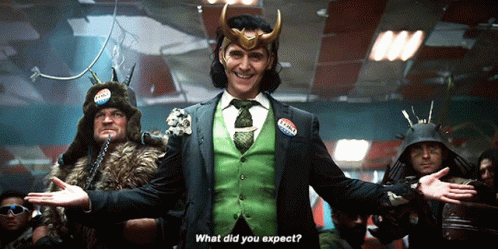
And now a few essential take-home points:
Republicans: stop conflating Republican Hulk with conservatives/conservatism. Republican Hulk isn’t conservative any more than MCU Hulk is a scientist. Quit whinging about how “conservatives are under attack and being censored online!” Nobody minds you representing conservatism. For God’s sake REPRESENT CONSERVATISM. What everybody minds (and understandably censors) is Republican Hulk rampaging online, spouting Q-anon, gun-toting, threat-level, TAKE THE COUNTRY BACK, militia-mongering BS.
So stop doing that. Become Bruce Banner again. And tell your friends to do the same.
Democrats: stop crowing about how awful militant Republicans are after applauding militant Democrats. You can’t say of your group “violence is justifiable protest!” and then condemn violence when it comes in Republican flavor. Those Republicans storming the Capitol represent a huge chunk of America that feels they’ve been denied a voice (in mainstream culture, at least) for many years. Were they right to interpret that as an excuse for violence? In the strongest words, NO. They were reckless, blinded idiots operating out of frenzy.
You’re right that the insurrection in the Capitol isn’t the same as the violence and looting that happened during protests across the country last summer (and in previous years). But only by technicalities and matters of degree. Is it worse to traipse around the Capitol like jackasses with malicious intent, or to loot and set fire to businesses belonging to your neighbors? Both resulted in property damage, injury, and loss of life. Both were fueled by opportunistic politicians. Both were justified in the name of offense and justice.
I suggest that they are either both reprehensible abuses of their cause, or neither. Double standards are the ugliest and more pervasive thing about our current political state. If it’s hunky-dory when your guys do it, but terrible when the other guy does, then there’s something seriously wrong with your sense of intellectual honesty.
Both sides: Stop burning the bridges. Like it or not, both sides need each other. Kept in balance, liberals and conservatives balance the dual natures of humanity. If you truly succeed in “destroying” the other side, all you’ll accomplish is to saw off the branch you’re standing on. So quit it.
Loki needs Hulk, and Hulk needs Loki. They can hate each other. They just can’t afford to destroy each other.

“Bad Thinkers” or Desperate Copers? Why Americans Really Believe Conspiracy Theories.
In his Aeon Article “Bad Thinkers”, Quassim Cassam tries to explain why people embrace conspiracy theories. Referring to a fictional example (Oliver, who believes that 9-11 was an inside job) Cassam says:
“Oliver believes what he does because that is the kind of thinker he is … there is something wrong with how he thinks.”
Oliver has “bad intellectual character”, Cassam says. The result, simply put, is a particularly endemic gullibility.
For an article that attempts to explain why so many people embrace conspiracies, this strikes me as a disappointingly simplistic explanation.
I myself have given this problem a lot of thought. I have engaged at length with people who believe conspiracies, from chem-trails to anti-vaxxers, all in an attempt to understand why they embrace not only the seemingly ridiculous theories, but the fringe “experts” who propose them.
I don’t at all believe that it can be explained simply by the “bad intellectual character” of gullibility.
What I observe in conspiracy theorists is a potpourri of three distinct, nearly universal factors.
First: Where coherence fails, confirmation takes over.
In an age of endlessly conflicting, even contradictory information, people necessarily choose their sources in part (or mostly) on how much those sources validate their own pre-existing worldview.
We see this happening before our eyes: in a time of pandemic, conservatives have become anti-maskers (because they distrust the government and tend to believe science has been politicized), while liberals have become ardent mask proponents (because they prefer top-down regulation and tend to view science with near-religious zeal). In both instances, people have chosen their trusted sources based exclusively on how those sources validate their existing political ideologies.
Conservatives tend to exhibit this trait rather more than liberals, since they tend to view “mainstream media” as politically liberal (not without reason) and science as weaponized against them (also not without reason).
This has resulted in conservatives embracing increasingly fringe, dubiously-credentialed “experts”. The quicker and more thoroughly these experts are censored and debunked, the more conservatives believe they must be espousing the truth. The most preposterous conspiracies will often be shared alongside the admonition: “Quick! Watch this video before YouTube takes it down again!”
Second: Never underestimate the Allure of Secret Truth.
Some people are simply inclined to be suspicious of broadly accepted facts. To them, the truth is not an open book embraced and understood by most. Instead, it is a secret treasure, hidden away by the nefarious and/or ignorant.
In their mind, the truth is only revealed to the elect few (like them) who are brave enough to seek it out, no matter the cost to their own reputation, security, or even their life.
And realistically, there have been just enough examples of government cover-ups and genuine conspiracies to give fuel to those clinging to such a worldview.
For acolytes of the flat-earth theory, for example, criticism, mockery, and official debunking are all viewed as exactly the sort of push-back that the truly enlightened should expect from the backward, ignorant, and tyrannical. Persecution is a badge of honor.
People of all political persuasions and social ideologies can exhibit the “secret truth” mentality. It explains 9-11 conspiracies, JFK assassination theories, Bigfoot, UFOs, and endless other fringe ideas.
For the believer in secret truth, the more arcane the conspiracy, the better, because even fewer people will believe it, thus making them even more rare and elect for uncovering it.
This mentality might, in fact, fall under the rubric of Cassam’s “bad intellectual character”. And yet I don’t believe that the “secret truth” fallacy is a flaw in and of itself. It’s just normal human curiosity overfed into heresy, fueled by a desperate need for significance.
Think about it: how many flat-earth conspiracy theorists do you know who are, in every other respect, fully actualized, healthy, and well-rounded human beings?
Third: Gullibility is less prevalent than deliberate blindness.
It’s all too easy to say that people who believe conspiracies are gullible. Or, not to put too fine a point on it, that they are too stupid to see the stupidity of their beliefs.
I don’t believe that conspiracy theorists are gullible (or stupid) as much as I believe they’ve become so overwhelmed with the chaotic complexity of the world, and the self-cancelling nihilism of modern media, that they’ve chosen to deliberately blind themselves to all but the parts that seem to make sense.
This is an understandable (if perhaps unhealthy) reaction. We shouldn’t mock them for putting on blinders. If anything, it might encourage us to examine which blinders we’ve put on ourselves.
For example, those of us who loudly proclaim that we never watch Fox News (or CNN) are simply fooling ourselves into treating our own blinders as a virtue.
So no, I don’t believe Cassam’s theory about people who believe conspiracies is any improvement over previous explanations. In fact, I believe his theory of “bad intellectual character” is a sort of smug self-congratulation, diminishing the complexity of humans, and the real difficulty so many people experience navigating a world that has become, in their lifetimes, a bottomless morass of conflicting, propagandized information and tribal extremes.
Viewed through these three lenses, on the other hand, we see how conspiracy thinking might worm its way into our own worldview, influencing how we consume media, interpret “facts”, and choose our trusted sources.
By understanding what motivates the more extreme examples of conspiracy theorists, we might more empathize with them because we see how, to perhaps only slightly lesser degrees, we all exhibit the exact same tendencies.
Dear White People: If You Really Want Change, Stop “Feeling Uncomfortable”.
Regarding America and race, it’s fair to say that we are living in a time of long-overdue upheaval. In the wake of George Floyd’s death at the hands of four cops, it seems that all of America has finally awakened to the reality of deeply problematic racial issues.
We need to address these issues, and for the first time, it looks like we may have the will and perspective to do so.
Which is why I reject the idea that we white people need to “be uncomfortable”. To “sit in it” (our racism and privilege).
We live in a culture that is surprisingly comfortable with prescribing to other people what they need to do. Repeatedly, I’ve been told (particularly online, and particularly by my white friends) that it is my duty to stew in discomfort for my part in racial inequality.
This idea has taken form in lots of recent books, but it is neatly summed up in this essay which has been shared by several of my white friends. “I don’t want you to feel at ease,” writes Kandise Le Blanc. “I don’t want to vindicate your white guilt. It’s yours to reconcile.”
I’m not going to debate the idea of “white guilt”. I’m not interested in whether all of us white people bear some responsibility for racial inequality. In fact, let’s assume we do.
What I question is the productiveness of feeling bad about it.
Recently, an online friend of an online friend (a woman who knows nothing about me except what can be gleaned from a profile picture) instructed me to “feel uncomfortable”, and then to seek out some black voices to educate myself.
The thing is, I actually began “educating myself” by listening to black voices long, long before the tragedy of George Floyd.
Two decades ago, I started reading books like the biographies of Frederick Douglas and Malcolm X. I sought to learn about the experience of people who were much different than me.
I wanted to understand the world beyond my own experience.
Strangely enough, as I listened to those voices and observed their experiences, I never felt any of the self-focused discomfort that is being prescribed today.
Even stranger, I didn’t sense that the black voices of decades past wanted me to feel that.
What I felt– and what I sense that they desired– was anger. And responsibility. Not the responsibility to feel bad about being white, but the responsibility to use my skills, voice, and yes, privilege, to affect change.
For me, that meant writing stories. Stories like “The Nightmare Pearl” that features a young black girl living in hiding from a justice system that she knows won’t be fair to her– and the confused white friend who has never had to fear a cop or distrust authority.
Stories like the one in my final game, Dream Revenant, in which a 60’s era white man must adjust to the death of his young black friend at the hands of the KKK– a death he eventually learns was caused by his own Klansman father.
I wrote these stories because unlike preaching to each other on social media, stories bypass all of our filters. Stories construct empathy. They erode ingrained prejudices.
I wrote these stories to help us all explore the complex relationship we have with racial injustice in America. To foster sober understanding and build bridges of empowerment.
I don’t have a LOT of influence. My stories and games haven’t changed the world. But it was what I could do. It was– and continues to be– my responsibility to use my voice, my skills, and whatever limited influence I have to make whatever limited difference I can.
But here’s the thing: If my response to learning about racism had been to stew in my own white guilt, to “feel uncomfortable”, to “sit in it”, I never would have written those stories. I never would have progressed to proactive responsibility. I never would have used what I have to do what I can.
It’s anger that empowers me to try to make a difference. Anger, and a sense of deep injustice– that things are not as they are supposed to be– that fuels me to use my privilege and influence to act.
Shame doesn’t empower to action. Nor white guilt. Nor stewing in self-flagellation for being white.
Honestly, isn’t “feeling uncomfortable” just a form of perverted self-righteousness? Isn’t it another way white people can make it all about themselves?
C. S. Lewis said that true humility isn’t thinking less of yourself. It’s thinking of yourself less.
White guilt is unproductive because it’s just another form of thinking about ourselves.
It’s time we white people thought of ourselves less.
That’s real humility. And this is very much a time for humility.
On the other hand:
If you are a white person who resents the idea that you should learn about the black experience in America, maybe you do need to get past your own pride and self-centeredness. If that makes you uncomfortable, then perhaps you should feel that and get through it.
If you are a white person who bristles at the idea of responsibility in terms of racism– if that idea makes you feel uncomfortable (and therefore angry)– then I suppose it does behoove you to feel that and get past it.
Because responsibility, in this instance, isn’t necessarily the same as blame. Responsibility is empowerment. It means that you have the position and influence to make a difference.
And thus the responsibility to do so.
And if you are a white person who experiences the lazy racism of callousness toward the voice of black protest, then I suppose it will require some pain and discomfort to break out of that selfish inertia, to face the reality that not everyone’s experience is your own.
Some white people, then, do need to wade through their discomfort with the reality of racism in America. Some white people may even need to atone for some injustice and hate they themselves have spread, or their families.
The problem with telling ALL white people that they need to “feel discomfort” is simple: the white people who need to feel it won’t (because it’s too broad a brush), and the white people who could be empowered to act will be too busy self-flagellating (on behalf of the white people in the first category).
I want to see us, as individuals and a nation, confront the history and reality of racial injustice and systemic racism in our country. I want to see us empowered to take action to undo that injustice, and be a better people.
And that is why I wish we’d stop telling all white people to stew in self-centered discomfort, to hide away under the rock of white guilt.
For a lot of us, we need to be doing, not feeling. We need to be thinking about ourselves less, not less of ourselves.
That’s how change will happen. And change needs to happen.
Five Rules for Modern “Thinking”
Everyone wants to be an evolved, intelligent, effective member of society. As thought processes and reasoning change with time, however, it can be difficult to keep up. The following are five tips to assure you are intellectually up-to-date, living fully in synch with modern rationality.
1) Bad People Get Their News From Biased Sources, But Your Biased Sources are Different
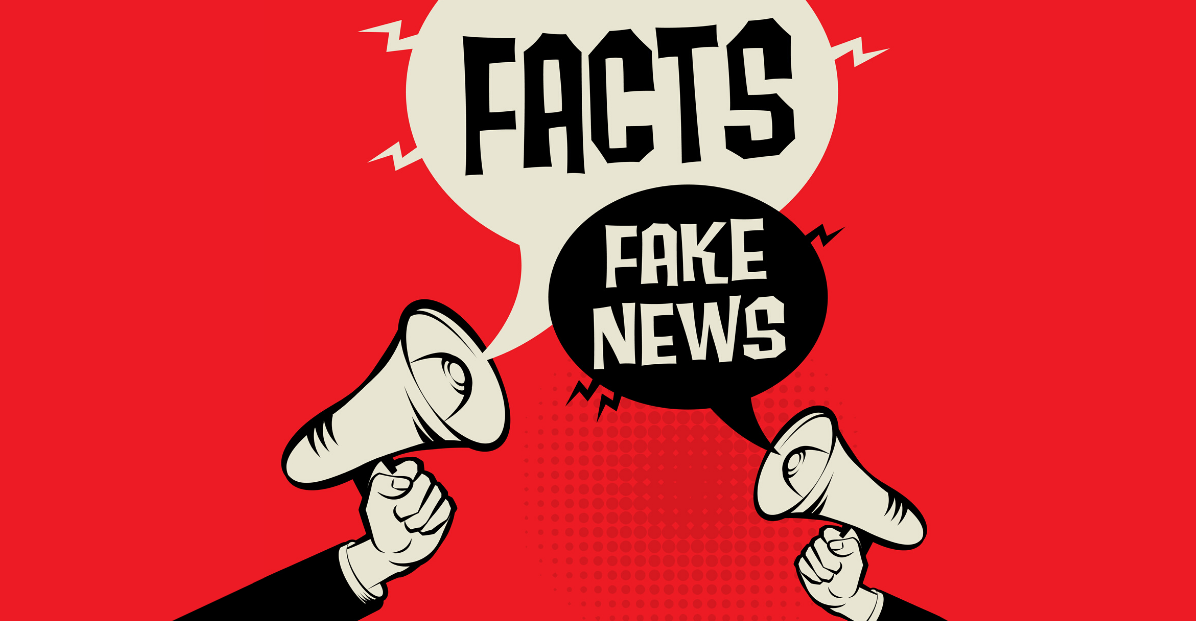 We all know that you can recognize the validity of any political news story based on its reporting source. Some “news” outlets are clearly partisan and biased, aimed cynically at the sad dupes who already agree with their pandering slant.
We all know that you can recognize the validity of any political news story based on its reporting source. Some “news” outlets are clearly partisan and biased, aimed cynically at the sad dupes who already agree with their pandering slant.
But be prepared: those same angry, intellectually dishonest people will claim that your news sources are also biased and partisan, only to the opposite extreme.
They will claim that your objection to their sources is a double standard.
You can safely dismiss this criticism, and not just because you can (and should) dismiss any and all criticism from the opposing viewpoint. The claim of a double standard falls apart instantly once one understands (as you surely do) this simple fact: their side’s “news” is slanted toward lies, hate, and stupidity, while your side’s news is biased only and exclusively toward the truth.
This is clear even to the other side. They just can’t bear to admit it.
Understanding this fact, we can safely assume that news from those other sources must be examined with the most stringent skepticism (if not automatically rejected), while news from your sources can be instantly accepted as flawlessly true, a pristine light of journalistic integrity in a swamp of “fake news”.
Clearly, this is not at all a double standard. It is an essential and reasonable reaction to a potentially confusing world of nuance, moderation, and complexity, all of which are counterproductive to the goal of total ideological purity.
2) If it’s Remotely Possible to Believe the Worst of Someone, it is Your Moral Obligation to Do So
 If there is one essential, functioning principle of our age, it is that we are waging an ongoing battle of good versus evil. Our side stands for truth and beauty, while the other side wages hate and destruction. Knowing this, we can feel supremely confident making blanket assumptions about other peoples’ motivations, intentions, and guiding beliefs.
If there is one essential, functioning principle of our age, it is that we are waging an ongoing battle of good versus evil. Our side stands for truth and beauty, while the other side wages hate and destruction. Knowing this, we can feel supremely confident making blanket assumptions about other peoples’ motivations, intentions, and guiding beliefs.
For example, when encountering an ambiguous but slightly controversial news story, our first imperative must be to determine the political/religious/social views of the people involved, no matter how tenuously related they may be to the story.
If those views turn out to be even slightly in favor of the opposition, then we should assume that the people involved are absolutely terrible in every possible way. This is key even if they strongly deny believing/thinking any of those things. It is entirely possible (and likely) that we, being on the side of good and truth, understand their internal thoughts and motivations much better than they themselves do.
In fact, the more they deny our allegations, the more certain we can be that they are true, and much worse than initially imagined.
By assuming the absolute worst in everyone even slightly tainted by the other side, we preserve the purity of our ideology and assure moral victory.
Occasionally, this may mean even turning on those who, at one time, seemed to ally and agree with us. We must feel no sympathy in those instances. Ideological purity is a constantly evolving process of rejecting the dross. There is no such thing as being too careful.
3) Always Define the Other Side by its Most Hilarious/Offensive Members
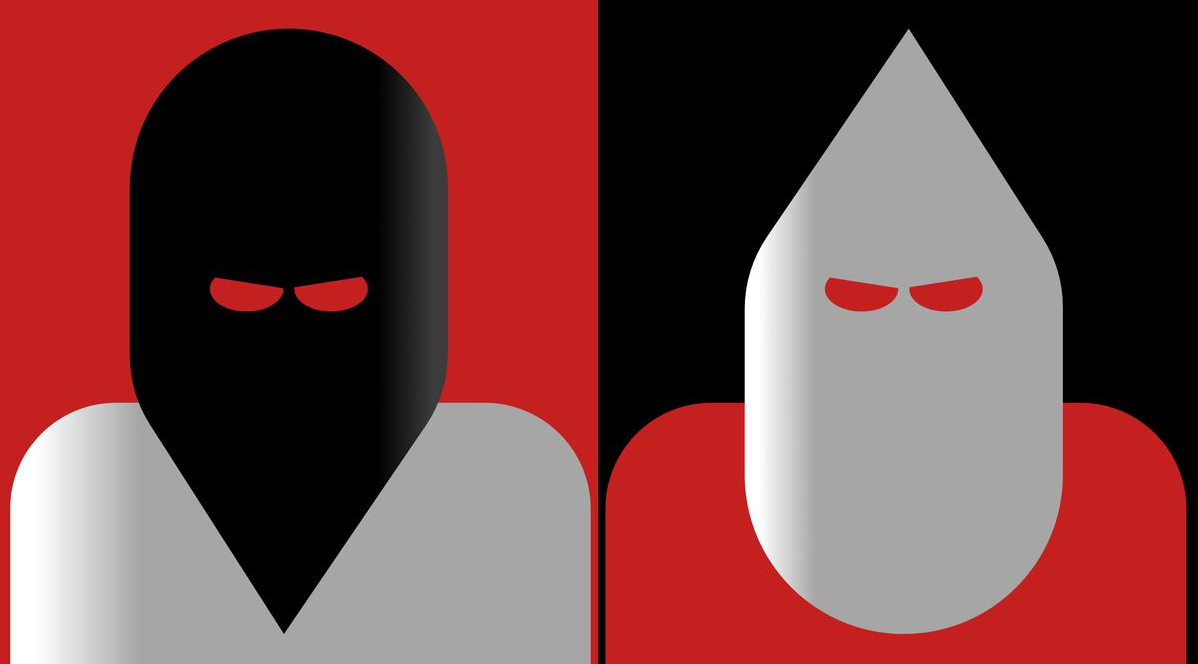 While we all know that, ideally, we should only associate with those whose views are in complete agreement with ours, it is sometimes unavoidable to have family or even friends on the other side of some political/religious/social issue.
While we all know that, ideally, we should only associate with those whose views are in complete agreement with ours, it is sometimes unavoidable to have family or even friends on the other side of some political/religious/social issue.
It might seem reasonable, in those instances, to define our view of the opposition by the family or friend who represent them, but we should be careful to do this only when that person exemplifies the absolute worst traits (racism, stupidity, eccentricity, immorality, etc) of that ideological tribe.
It is safer by far (on the off chance that you might actually like said friend or family) to always define the opposition by its most comically extreme, impersonal, public caricature.
The reason for this is clear: if you define the opposition by the person you know who represents the opposition, it will become harder for you to believe that only stupid/evil people support the opposition.
Since the key to modern thinking is an absolute certainty that the other side is stupid and evil, we must always choose extreme, loud, public symbols—cartoonish avatars that, by essential definition, we do not personally know—to define their side.
By so doing, we accomplish two important goals. One: we enable our side to maintain seamless certainty that the other side is utterly bereft of even the slightest virtue or dignity. And two: we may succeed in shaming those family or friends who, by some lapse of morality or intellect, identify with that other side. At the very least, we may pressure them into hiding their shameful views. At best, we may shame them enough to force a change of opinion, thereby granting them the right to speak their convictions aloud.
4) It’s Not the Same if Your Guy Does it
 Having firmly established that we must assume the worst of any person based on their oppositional political/social/religious views, we may now approach the equal and opposite conclusion: that anyone who shares our views cannot be evil or stupid.
Having firmly established that we must assume the worst of any person based on their oppositional political/social/religious views, we may now approach the equal and opposite conclusion: that anyone who shares our views cannot be evil or stupid.
These twin axioms can be summed up in a simple equation (AKA Clintrump’s Law): The guilt of any allegation is inversely proportional to the accused’s association with my approved ideology, multiplied by the severity of the alleged act.
Thus, when confronted with, for example, an accusation that a politician has had an illicit affair, our first question must not be, “is this true, and if so, how immoral is it?”
Instead, our first question should be, “is this politician on my side?” If the answer is no, then we must assume that he is a serial womanizer, deserving of nothing but contempt and removal from office. If the answer is yes, then we must assume he was sorely tempted just this once, is deeply remorseful, and deserving of our forgiveness and respect for his authenticity.
If it turns out the affair was with, say, a cross-dressing foreign terrorist spy, then our initial assessment should only be deepened and permanently ossified.
5) Centuries of Debate Can be Solved With a Single Meme
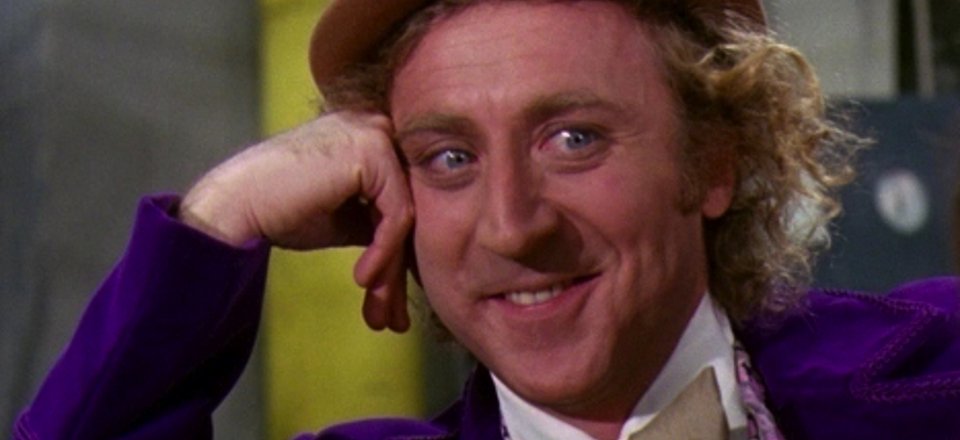 There is a somewhat backward idea that intelligent people can disagree on complex issues. This leads to the assumption that debate on difficult topics is the only way to respectfully and genuinely hone ideas, test assumptions, and ultimately approach something like ultimate truth.
There is a somewhat backward idea that intelligent people can disagree on complex issues. This leads to the assumption that debate on difficult topics is the only way to respectfully and genuinely hone ideas, test assumptions, and ultimately approach something like ultimate truth.
We now know that this perspective is backwards, and even counterproductive.
Having understood that the other side is simply evil and stupid, we know that it is inherently dangerous to allow them to voice their views at all, much less to honor them with debate.
Thus, true ideological purity is best measured by a singular, stubborn, abject ignorance of the opposing viewpoint.
This serves two purposes. One: it safeguards our own viewpoint (and that of our youth) from any dangerous challenges. And two: it frees us to believe that centuries of intellectual debate can be “destroyed” by a single meme, quote, or emotional anecdote.
These are the bedrock cornerstones of our confidence. Without the conviction that all issues can (and should) be forever settled with easily-sharable click-bait, we may eventually feel the temptation to engage our own critical thinking. Worse, we may end up having conversations—even respectful debates!—with actual people who disagree with us.
Be on your guard against this, at all costs. Post the memes instead, thereby broadcasting your complete ideological certainty, along with your tacit unwillingness to consider any other perspective. This is the only way to assure your ongoing ideological purity, to be welcomed into the tribes of modern “thinking”.
And just to be sure, if you do not adhere to this perspective, or continue exhibiting all of the other traits of modern “thinking” listed above, the rest of your tribe will notice. We will come for you.
It’s not personal. It’s just the only way modern “thinking” works.
Why You Aren’t a Computer Simulation (But Elon Musk Might Be)
Recently, a New York Times article asked the question: Are we living in a computer simulation? Then adds: let’s not find out.
Why? Because if we are indeed living in a computer simulation, and the programmers of that sim find out we’re onto them, they might just pull the plug on our universe.
Unless what they’re studying is how humanity would respond to finding out we’re living in a computer simulation, in which case we’d better carry on or risk forcing those hyper-advanced geeks to reboot our universe and start over.
 “They’re onto us. Delete them before they find my directory of Sonic the Hedgehog porn”
“They’re onto us. Delete them before they find my directory of Sonic the Hedgehog porn”
A lot of people believe this theory, or find it so plausible as to be virtually assured. Elon Musk says the chance that we are living in “base” reality is a million to one. Even everybody’s favorite science teddy bear, Neil DeGrasse Tyson, believes it’s about fifty-fifty that we’re all just figments in a futuristic virtual reality.
And honestly, the theory seems plausible enough when we look at the world around us and see merely a web of interconnected (albeit complicated) actions and reactions; a universe that could plausibly be dictated by some sufficiently advanced computer program.
Except for one major thing—a thing I can’t believe these super smart people haven’t taken into account. A thing that isn’t in fact, in the world around us at all.
It’s this:
The idea that you are a computer simulation stops being plausible when you ask: why does that matter to me?
 “Why am I worried that Andy Dick might not be a real person?”
“Why am I worried that Andy Dick might not be a real person?”
Meaning, if you, the reader of this blog, are merely a digital figment in a futuristic simulated universe, why should you experience any internal, invisible, conscious reaction to it?
What purpose would that reaction serve?
Why, in fact, should any of us have any internal, conscious self-awareness at all?
Elon Musk might argue that the internal consciousness—the part that makes you aware of being you and not anyone else—is an essential component of the simulation.
But why? What practical purpose could that possibly serve?
The machinations that occur inside your internal consciousness don’t affect me, as another person, until they motivate you to some action. For this reason, it would be non-essential (and terribly inefficient) to program billions of computer figments with rich, internal consciousnesses when all that matters to the simulation is their resulting actions.
“Self-awareness (being, by definition, only useful to the self experiencing it, and not at all to the simulated universe at large) would be utterly superfluous.”
Think about your own experience of other people. You have no direct interface with the inner consciousness of any other single being. Your only understanding of other humans is through symbols they present to your senses—the words and actions that comprise the sum total of our experience of the rest of humanity.
Thus, if a simulacrum of humanity was created for some advanced experiment, words and actions would be all that was needed to accomplish its purpose.
There would be absolutely no reason for you, as an actor in that simulation, to experience any internal self-awareness, since that self-awareness serves no purpose to the simulation’s outcome.
Instead, you, as a simulated figment, would be to the computer what all of the rest of humanity is to you: mere bundles of words and actions responding to a complex code of environment and programming.
 Basically, high-res Donkey Kong
Basically, high-res Donkey Kong
In short, even if some advanced civilization were to develop the capability to invest a simulated personality with self-awareness, there would be no practical reason to do so. It would be far easier (and more ethical, which we will come to in a moment) to simply rig each simulated personality to behave and speak according to that complex code of environment and programming.
Self-awareness (being, by definition, only useful to the self experiencing it, and not at all to the simulated universe at large) would be utterly superfluous.
Thus, in a simulated universe, you would not be consciously reflecting internally on what all this means to you, as a self-aware being. You would instead be a symbolic figment, like a non-player character in a video game, whose programmed actions would henceforth be nominally altered by this new input.
Since you are internally aware of this distinction, then you can feel confident that you, at least, are not a mere line of code in some hyper-advanced simulation.
Unless, of course, self-awareness is (for some reason) necessary to the simulation.
Which bring us to the ethical consideration.
Imagine a civilization advanced enough to create simulated personalities that experience self-awareness. Would not this civilization also understand the responsibility inherent in creating such a universe of beings? Certainly they would understand that the moment self-awareness is granted, a person is created.
With the insertion of consciousness, mere inert programming becomes new life.
 Why else do we care about these two?
Why else do we care about these two?
Conclusion: since you, reading this, have self-awareness—an internal and invisible consciousness of being you and no one else—then we can logically infer from this one of two comforting assumptions:
One: that we are probably not the simulated creation of a hyper-advanced computer model, since there would be no value in creating simulated figments with conscious self-awareness. It would simply not serve the simulation in any measurable, practical way to include such a complicated and ethically problematic detail.
Or two: that even if we are computer simulations imbued, for whatever reason, with conscious self-awareness, then it stands to reason that such an advanced society would also understand the ethical responsibility of creating what is, essentially, sentient life, and would treat it as such.
Unless, of course, that society is both hyper-advanced and painstakingly sadistic, which is possible, albeit highly unlikely (despite my conviction that humanity is, at best, only accidentally good, and only sometimes). I simply don’t believe that a truly sadistic culture could survive long enough to create such advanced computer technology as would be required for self-aware digital life.
So: Neil DeGrasse Tyson, Elon Musk, and the rest of us can breath easy knowing that either we are, in fact, “base reality” (most likely) or at least that our programmers know and respect that they’ve created a form of life deserving of preservation.
So how do the smartest minds in our universe miss this fairly obvious clue that we aren’t in grave danger of being turned off/rebooted?
Maybe it just proves that sometimes the smartest people are likely to miss the simplest truths.
Or maybe it proves that the purpose of this simulated reality is to make me believe that I’m smarter than Elon Musk and Neil Degrasse Tyson.
Both explanations seem equally likely to me.
Why Christians Should Watch “Good Omens”. With their Teens.

Perhaps you have heard of the new Amazon Prime series “Good Omens”, based on the novel by Terry Pratchett and Neil Gaiman. Perhaps you are aware that thousands of Christians petitioned that the series be cancelled because, among other things, it allegedly normalizes Satanism.
Perhaps you are one of those Christians. And perhaps you are one of the people who find it hilarious that the petition was aimed at Netflix instead of Amazon Prime.
This post is for both of you. And everyone in-between.
I am a Christian who not only loved the novel “Good Omens” but watched the series and enjoyed it immensely.
Worse (or better, depending on which of the above categories you fall into) I watched it with my teen kids. And I think you should as well.
Here are the five reasons why.
1) It’s Bible fan-fiction.
Back in the eighties, when I was a kid, eschatology (the study of the End Times and the book of Revelation) was a huge fad. All of us Christians were obsessed with books like Hal Lindsey’s bestseller “The Late, Great Planet Earth”. Our youth groups showed us campy Christian horror films about the Great Tribulation. We ate up conspiracies about how the UPC code was the Mark of the Beast, and how, before too long, we’d all have one stamped onto our foreheads or wrists.
And then we grew up a little. The end times didn’t happen (yet!). And we all gave each other a sort of sheepish look and silently vowed never to speak of it again.
To the extent that, after I watched the first episode of Good Omens with my 14-year-old daughter, she said to me, “so, is that stuff actually in the Bible?”
Perhaps we’ve sort of gone too far the other way.
Terry Pratchett and Neil Gaiman are atheists. And yet they clearly have at least an intellectual fascination with the Bible. It shows. They get loads of details spot-on. And this counts for something.
When the four horsemen of the apocalypse are being summoned, they are given (by a cheerfully hapless deliveryman) a sword (War), a set of scales (Famine), and a crown (Pollution/Pestilence). This is all straight out of the book of Revelation. Most Biblical neophytes probably recognize that.

And they ride motorcycles. Because horses. Get it?
But when Death, the final of the four horsemen, is summoned, he is not given anything. Instead, the deliveryman offers a verbal message: “Come and see”.
This is a curious detail for the authors to include, because it will only mean something to the sort of people least likely to read/watch “Good Omens”—namely, Christians.
I looked up the relevant Bible passage. It’s in the sixth chapter of Revelation:
“And when he had opened the fourth seal, I heard the voice of the fourth beast say, ‘Come and see’. And I looked, and behold a pale horse: and his name that sat on him was Death, and Hell followed with him.”
Why would Pratchett/Gaiman include a detail like this? A detail that most of those reading “Good Omens” wouldn’t recognize or understand?
Because originally, they were writing mostly for each other. No publisher had suggested their collaboration. It was a project between two friends, both of whom had a fascination with the Bible, despite rejecting its main premises.
They weren’t thinking about Bible references that other people would get. They just knew that they would get them.
That sort of appreciation for the Bible as source material, as rich narrative foundation, tells us something about the importance of the book. Pratchett and Gaiman exhibit an attitude that many modern atheists have lost: that it matters to read the Bible, to know it, even if you end up not believing it.
As a believer, I encourage this, and want my kids to see that it matters.
2) “Good Omens” provides an invaluable insight into an unbeliever’s perspective.
While the story may be Bible fan-fiction, it’s clearly written from a perspective that misses the fundamental message. But it does so in a way that is somewhat common. As such, it provides the thinking Christian an invaluable insight into the mindset of those who choose not to believe.
If you don’t see how this is important, I expect you wouldn’t also have seen why Jesus went to the sort of parties he did.
During one early scene in “Good Omens”, the angel Aziraphale and the demon Crowley are observing the parade of animals filling Noah’s ark. Crowley asks Aziraphale what this is about, and the angel sheepishly admits that God plans to wipe out most of humanity. The demon looks on at a group of goats, blinks, then turns back to Aziraphale. “Not the kids, too?”

It’s a bit of a joke, of course. But the point is clear: it’s the demon who has qualms about wiping out all of humanity. The angel, on the other hand, is seen as complicit in a sort of heartless, divine doomsday.
As Christians, this is a perspective on the Old Testament that we must be prepared to respond to, with respect and understanding. To our unbelieving friends, our first reply might be “I want to validate your commitment to fairness, tolerance, and mercy. Those are excellent, excellent things. If you really are curious to know why a God of both mercy and righteousness would paradoxically take such extreme courses, let’s talk.”
It’s essential for believers not to shy away from those discussions.
And how can we be prepared to have those discussions if we don’t have some idea what the unbeliever’s typical perspective (and understandable objections) might be?
“Good Omens” is like a primer on an unbeliever’s perspective of Christianity. It may not always be comfortable for the believer to read/watch, but it is extremely illuminating if your intention is to be relevant to your irreligious friends.
3) “Good Omens” serves as an allegory about humans and religion.
Whether you are a Christian or an unbeliever, I challenge you to shift your perspective on “Good Omens” by one degree: view it not as a story about angels and demons, but as an allegory about eternal, divine matters in the hands of nearsighted, fallible humans.
Once we view the story’s angels not as divine beings but as occasionally misguided and overzealous Christians, we see their flaws less as blasphemy and more as cringy real-world examples of believers taking matters into their own hands, making arrogant assumptions, trampling people as pawns, generally giving God a bad name.
Looked at from this perspective, “Good Omens” changes from a comically blasphemous farce to a razor-tongued satire. For Christians, it becomes a mirror forcing us to ask ourselves: how likely is it that I come across like John Hamm’s Gabriel-– arrogant, glib, more committed to being right than showing love?
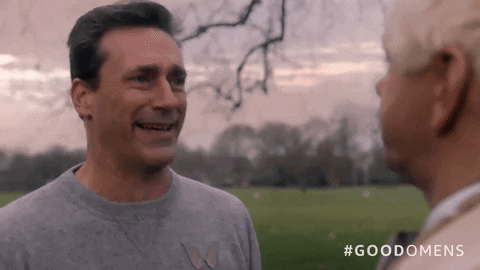
“The world’s not just going to end itself.”
Further, from this perspective, the relationship between the angel Aziraphale and the demon Crowley (the heart of the tale) is no longer a challenge to the dichotomy of good and evil.
Instead, it’s a picture of a believer whose commitment to ultimate Good not only doesn’t preclude him from befriending the unrepentant: it actually encourages him to. To the extent that both of them are bettered by that interaction, and (arguably) the “demon” is ultimately redeemed.
Too many Christians live their lives the way the bulk of “Good Omens”’ angels do: far more committed to their culture war than to the subtle persuasion of lifestyle evangelism. Too few are willing (as Aziraphale did with Crowley) to view unbelievers as fertile ground rather than chaff for the hellfire.
4) In “Good Omens”, God wins, Satan loses
Amazingly, God never appears on-screen in the series. Instead, God is represented throughout in the form of the narrator.
What does this tell us? That from the very beginning of the story, God is in charge of everything that ultimately happens. God is not only aware of Aziraphale’s inner doubts, human compassion, and fraternization with “the other side”, God is actually cultivating and harmonizing those things, all for the ultimate good, despite what the rest of the angels and demons might have in mind about “the Great Plan”.
In short, God is the ultimate Good Guy in “Good Omens”. This is no small thing!
But of course (you might breathlessly point out) in “Good Omens”, the Good Guy isn’t actually, in point of fact, a guy at all.
God is voiced by a woman: academy award winner Frances McDormand.
Christians, before you get your choir robes all up in a knot, think for a moment about current culture. If God, as narrator, were introduced as yet one more man—as the stereotypical booming voice from above—how might the typical modern viewer react?
Like it or not, big male voices are no longer automatically viewed with warmth and reverence. They are just as easily met with ire and suspicion.
By choosing a woman to provide God’s voice, the creators were communicating one thing: this character is a reliable narrator. This character understands the human story better than any other. In a milieu of duplicitous angels, comical demons, and questionable institutions, this character– God– is trustworthy, relatable, and ultimately, unequivocally, fortunately, in complete control.
God is not defeated in this story. On the contrary, the implication from the very first spoken words of the series is that God wins.
Satan, on the other hand?

Satan is represented as a monstrous beast, the creator of the anti-Christ, the author and driving force of the evil of Armageddon. We can quibble over the theology of that premise, but here’s the essential thing: Satan loses. Unequivocally. Satisfyingly. Utterly.
So just to check the scoreboard on this one: In a story written by two atheists—a story at least nominally intended to lampoon and satirize religious institution—God is represented as a reliable narrator orchestrating true, rare goodness, found in the humblest and most surprising of places, to overcome both his misguided servants and a committed demonic horde, for the purpose of redeeming the world and destroying Satan.
I don’t believe this is a story that Christians should be picketing.
Instead, this story should give us some hope that even those who don’t believe in God and the Bible have some instinctive, fundamental appreciation for God’s ultimate Great Story—the “Ineffable Plan”, as Aziraphale puts it.
I, for one, find this encouraging.
5) “Good Omens” is extremely entertaining and funny.
I saved this for last, not because it’s more or less important, but because it’s a thing that we believers should be cognizant of.
As one of my Facebook friends pointed out in response to the Christian backlash against “Good Omens”: “Why can’t we conceive that god has a sense of humor?”
Unlike Jesus, we Christians can just be a frowning bunch of sticks-in-the-mud, can’t we?
“Good Omens” is genuinely funny and entertaining. Even if it was blasphemous and demeaning to our faith (which I think is a stretch), when we militantly protest such stories, we run the risk of coming off as grim, joyless, judgmental fussbudgets.
We allow ourselves to be defined by what we oppose more than what we believe.
And that sort of thing just doesn’t win anyone to God. It only entrenches the already far-too polarized sides.
So lighten up a little. Take a joke. Further, use that joke for a moment of humble self-reflection. Crack a smile. Watch the scene in “Good Omens” when Crowley the demon runs into the church to rescue Aziraphale the angel and has to jump around like a barefoot kid on a hot beach, hissing “Ow! Ow! Holy ground!”
And stop trying not to laugh. It’s funny!

Don’t be afraid to read/watch “Good Omens”. Crack a smile. You won’t go to hell if you think it’s secretly funny that Crowley’s name used to be “Crawly” because he was the snake in the Garden of Eden.
Be happy that two atheists thought enough of the Bible to read it and make their own conversation-provoking story out of it.
The Fridge of the Knowledge of Good & Evil

Let me phrase this Biblically: In the decade of the nineties, while I was not yet twenty-five years old, and was still abiding within the basement of my ancestors, it seemed right to my parents and I that I should attend a Bible college.
That lasted for exactly one semester and was but one of several of my attempts at groping my way into something resembling a career.
At the suggestion of a church friend, we found ourselves trekking to Rhode Island and a little Pentecostal compound called Zion Bible College.
It was a “faith school”, meaning you paid whatever money God “put on your heart” to pay. During my time there, it seemed evident that God had put on most peoples’ hearts to pay about two bucks fifty, because the school was in a disastrous financial tailspin.
One of the repercussions of this was the cafeteria food. There were never seconds, and despite the food being objectively terrible (I made up my own Weird Al parody of “You Can’t Touch This” and we would often sing it in the cafeteria line: “I can’t eat this!”) on the rare occasion that seconds were allowed– on a first come, first served basis– the resulting stampede of hungry college students (myself definitely included) was both hilarious and tragic.
A sort of black market sprung up to compensate. A guy in my dorm had a mini fridge and for a nominal fee he would sell you anything from a wrapped single of American “cheese” (25¢) to a microwaved hotdog with bun ($1.25).
I got myself a job as a security guard at a hospital in nearby Providence. When my first paycheck finally came, two weeks later, I bummed a ride to McDonalds and bought three Big Macs. And ate them. And was full for the first time in what felt like years.
A little later I came to my senses and found a local grocery store. There, I stocked up on staples like lunch meat, cheeses, bread, condiments, chips, milk, soda. When I got back, heady with triumph, I was unpacking in my dorm and my roommate asked me, “Where are you going to put all that?”
My roommate’s name was Tom. Tom was an affable, genuine, easy to like guy. He was looking at me with something like suspicious concern.
“I’ll stick it in the fridge down in the common room,” I said.
The common room was a basement with a sprung couch, a few old recliners, and cinder block walls covered in peeling, mint-green paint. There was a broken console TV and an antique communal fridge.
Tom just looked at me. He was a couple years older. This was not his first semester at Zion. “You can’t do that.”
“Why not? It’s for all of us to use, right?”
“All of us will use it.”
“This is a Bible college. People won’t just steal my stuff.”
I put it all in the communal fridge, in an unmarked brown paper bag.
The next morning, my milk was gone. As was the meat, the cheeses, and the sodas. The only things left were what I had kept in my dorm room.
I ate dry cereal by the handful and fumed in perfect disbelief.
This was a BIBLE COLLEGE. Not just a Christian school. People didn’t come to Zion for a side of chapel with their Business Administration degree. They came to Zion to become pastors and church leaders. Right?
Next payday, I went to the grocery store again. I bought all the same stuff. This time, back in my dorm, Tom watched bemusedly as I wrote all over the brown paper bag. Big, thick letters in black Marks-A-Lot: THOU SHALL NOT STEAL! Treasures gained by wickedness do not profit! Nor thieves, nor swindlers will inherit the kingdom of God!
I felt good about this. I was not only righteously protecting my stuff, I was protecting the very souls of my weaker brothers from their waywardness, bringing them back by brute, shaming force onto the straight and narrow, saving them from the cursed downward spiral of perdition!
The next morning, the bag was the only thing left.
I tell this story because that experience reminded me of one essential, fundamental truth about Western religion, something I’ve tried to keep before me in the years since: Christians can often be the very least reason to consider Christianity.
The church often seems cram-packed full of disproportionately more broken, hypocritical, deceitful, loud-mouthed, ignorant, combative, hateful, and just plain ugly-minded people than one might encounter in almost any other sphere.
And this should come as no surprise. The church attracts the people that know they’re screwed up. People who think they have their crap together find little reason to turn to God. Thus, it might be considered a legitimate complaint for people to say of the church, “Why do I want any part in that? Those people are a mess.”
Because it’s true. Largely, they are.
And yet, fortunately, because they’ve turned to something bigger than them, they are also gradually less of a mess than they would have been otherwise.
That’s why my experience at Zion didn’t destroy my faith. Because my faith isn’t in the people that carry God’s banner. It’s in the God who insists on bestowing his banner on incredibly flawed people.
With that in mind, if I had one message for my Christian friends, it would be this: stop being surprised that everybody outside the church thinks the church is a bit of a joke– a support group for wackos, an echo-chamber of caricatures. The awkward truth is: it sort of is. And this is a good thing, because it means we’ve realized our failings and found the one place where we can have them addressed and remedied, over time, by the one that designed us.
And if I had one message for my non-church friends? If you are waiting for the church to become attractive enough to join in, I’m afraid that ain’t never gonna happen.
There are churches of apparently beautiful, with-it, accomplished, successful people out there. But I bet you can imagine the problem with that. Those are churches of the theology of posturing, boot-straps, and self-help. You can get that from Oprah, and she’s way better at it.
Instead of waiting for the church to get it’s act together, check out the God who’s willing to love and work with such a motley mess of half-broken, often embarrassing, sometimes even community-fridge-thieving losers. A God who says “you don’t have to stop being a complete mess before you come to me. You can’t do that on your own anyway.”
A God who loves people while they are still pretty damn unlovable to the rest of us.
Like the ones who hoarked down my ham and cheese, leaving nothing but a half jar of Stadium mustard, lid off, like the corpse of a murder victim. It’s a good thing my faith wasn’t in other Christians, because I’d have tossed it then and there like a candy wrapper.
But that doesn’t mean I still don’t hold a vengeful grudge against that bunch of hypocritical, Bible-thumping nincompoops.
Maybe Justice isn’t Blind, just Nearsighted
Last spring I was riding my bike to work, a little after 8AM, rolling through Perry Square park, and passed a guy sitting on a bench with a freshly opened case of Milwaukee’s Best.
My first thought was: Milwaukee’s Best?? Including the word “Best” in your beer’s name is like wearing a “World’s Greatest Lover” tee shirt to the unemployment office: the crowd you’re advertising to isn’t interested in the claim you’re leading with.
 OUR CAVIAR IS “THE FRESHEST”.
OUR CAVIAR IS “THE FRESHEST”.
But my second thought was: is this guy actually intending to sit in front of the fountain all day slowly killing an entire case of something one might loosely call beer? Is this legal? What are the sociological/economic implications of this for a town trying to revitalize itself?
I lean Libertarian, so none of those questions are exactly rhetorical. I think I was mostly wondering about the legal aspect.
It turns out that, unlike most places I’ve lived, publicly drinking one’s weight in “Best” is perfectly legal in Erie parks. This struck me as curious.
Yesterday I came across a local news story that went something like this: Erie officials table discussion of public alcohol bans. Why? Over concern that it might predominantly target the poor and homeless.
I know most of my friends—and I assume most reading this—agree that unfairly targeting the poor and homeless is generally a bad thing. Broadly speaking, I concur.
 Unless you’re targeting them with a hotdog gun.
Unless you’re targeting them with a hotdog gun.
But am I the only one whose brain, annoyingly fussy about intellectual honesty, chimes in and says: but since when do we tailor laws based on the demographics they may impact?
Just to briefly entangle you in the type of mind I live in, let’s imagine some alternate versions of the getting-legally-sloshed-in-the-park story:
Highway patrol tables discussion of speeding in school zones over concern that it might predominantly target people with driver’s licenses.
Federal Trade Commission tables discussion of unfair lending practices over concern that it might predominantly target rich white bankers.
UN tables discussion of international piracy over concern that it might predominantly target international pirates.
But then my internal woke liberal (somewhat malnourished, admittedly) jumps in to say “those comparisons don’t work because there is no equivalence between the underprivileged and those other groups. Anyone can have a driver’s license, but the poor/homeless are predominantly minorities. Rich white bankers are privileged, therefore don’t deserve special protections. And pirates are lawbreakers by default, whereas IT’S NOT A CRIME TO BE HOMELESS OR POOR.“ (My internal woke liberal screams a lot).
At which point my internal angry conservative (old, demoralized, with hilariously unkempt eyebrows) starts hyperventilating into his MAGA hat before shouting (with a lot of spit) “Thanks OBUMMER!”
 My brain is basically one folding chair away from being the Jerry Springer show.
My brain is basically one folding chair away from being the Jerry Springer show.
Pushing both of them aside, with difficulty, I’m still confused. Isn’t justice supposed to be blind? Isn’t that why she is always personified as a blindfolded figure with scales? We are comfortable with the idea that the blindfold means she isn’t partial to the rich. But doesn’t that also mean that neither is she partial to anyone else? Even the poor and homeless with terrible taste in beer?
If justice is truly blind—if all people are equal under the law—then I’m curious about the legal argument that works for tabling laws that tend to impact poor minorities but that doesn’t work for laws that tend to impact old white dudes.
And peeling back the layer a bit further: I feel like if I was a poverty-level minority type, I’d be offended at the idea that a law about not getting tanked under the statue of Oliver Hazard Perry was specifically aimed at me. I think I’d be like “thanks for the low expectations, stereotyping white-guilt do-gooders! Hows about focusing on the frat dudes stumbling through the park after an Otters game taking leaks on the war memorials? Eh? I don’t hear anybody lamenting how public alcohol bans unfairly target the forty-year-old accountants tailgating outside Erie Arena.”
Anyway, all this to say that, honestly, I don’t have any dog in the fight about park drinking. While I’m no fan of dudes spending their days publicly swilling in the park while kids splash in the fountain, neither am I a fan of meticulous regulation of what should be mere common sense. So on this issue my response is mostly a big sighing shrug.
I am mostly interested in the intellectual argument for justifying not passing a law based on the community it might impact. This seems, on the face of it, to fly directly in the face of how laws are supposed to work—that justice is blind, and not expected to contort based on demographic implications.
What think you?
3 Reasons I Don’t Wear a Bike Helmet (and 1 Reason You Should Keep Telling Me To)
 I wrote a book recently called “Misery Bay” in which—spoiler alert—a character dies when he is struck by a car while riding a bike without a helmet.
I wrote a book recently called “Misery Bay” in which—spoiler alert—a character dies when he is struck by a car while riding a bike without a helmet.
This is ironic because I myself don’t usually wear a helmet while riding my bike.
I say this to communicate two things: I understand the arguments for wearing a helmet. And there are still many times when I don’t put mine on.
The following are three reasons why I don’t usually wear a bike helmet. And one reason why you should keep telling me to.
1) A little risk isn’t a bad thing
It’s been said that when humans stop being hungry they start being afraid. I expect that any objective look at Western culture would confirm this. For the most part, we’re pretty well fed. And for the most part, we’re obsessed with safety.
From the playground to the job site, “Safety First” is our driving doctrine, our singular prime directive. In fact, it’s my opinion that we’ve become so obsessed with preventing even the slightest risk and danger that fictional risk and danger have become our guilty pleasures.
Why? Because the truth is that we humans crave a little risk.
Why do kids climb trees? Why do adults parachute out of planes? Why do white suburban teens listen to gangsta rap? Why do stupid people film themselves performing the latest Internet “Challenge”?
Because some degree of danger and uncertainty is alluring. It’s hardwired into our psyche. It’s what makes us inventors, and explorers, and artists. There is no reward without risk.
 Although, for the dumbest few, there is plenty of risk without reward.
Although, for the dumbest few, there is plenty of risk without reward.
This is why I reject the concept of “Safety First”, even when it takes the form of bicycle helmets.
I grew up riding a bike. We rode endless miles of country roads with no helmets and nobody blinked an eye. Was there some element of risk in that? Probably. In the same way that there was some risk in rope-swinging into a country pond or traversing a fallen tree over a storm-swollen creek (things that would also be verboten in today’s hissy-fit religion of worry).
Like climbing a tree, riding a bike simply wasn’t anyone’s idea of an extreme sport. It was just a slightly faster-than-walking-pace means of getting from here to there.
Which brings me to point #2:
2) I don’t do what helmet-wearers do
Like death and taxes, some things are absolutely axiomatic. Every single time the subject of bicycle helmets comes up, the nearest bicyclist tells me their horror story of the time their helmet saved their life. And every story starts something like this:
“I was with my riding group doing thirty-five through a construction site when…”
Or:
“I was mountain biking down a steep, muddy path when…”
Or:
“I was chasing a gang of bicycle ninjas through a monsoon along the hairpin turns of the Amalfi coast when…”
 “Two hundred foot drop to jagged rocks? Good thing I’m wearing this plastic helmet!”
“Two hundred foot drop to jagged rocks? Good thing I’m wearing this plastic helmet!”
Look, people: I don’t ride like that.
When I’m riding, I’m not in Beast Mode. I’m in toodle-mode.
I’m not out to break any records, or test the frayed limits of human endurance, or swoop through heavy traffic like I’m being filmed for a Bond movie. I don’t go much faster than running pace. I don’t lock my shoes into my pedals as if me and my bike were some sort of steampunk man/machine hybrid. I don’t race down mountains, jump creeks, or dodge boulders at speeds measured in hundredths of a second.
I meander. Even when I am coasting down the quarter-mile hill to Presque Isle (my favorite ride), I keep to the bike lane and thread my brakes to stay below fifteen miles an hour. Why? Because I am aware that traveling any faster on a two-wheeled vehicle with no airbags, seat belts, or crumple-zones is an unwise and foolhardy exercise.
And I can hear some of you saying, “But what about the drivers!? What if some car swerves onto the path with its evil combustion engine!?”
I’d be in the exact same danger if I was walking, wouldn’t I? And yet no one ever suggests that I wear a helmet as a pedestrian.
 “A Walking Helmet is a Good Helmet” — DAMMIT, irony!
“A Walking Helmet is a Good Helmet” — DAMMIT, irony!
Why?
I’m always tempted to respond to these cycling tales of the macabre with the story of Stephen King, who was struck and nearly killed by a van while merely walking alongside a Maine road near his home. Does his story make you want to wear a helmet every time you head out for an after dinner stroll? For some of you, it actually might.
For the rest of you, nor does the fear of rogue drivers keep me from riding the bike path without a helmet. I have a handlebar mirror to watch for traffic, I avoid riding my bike on busy roads wherever possible, and I keep on high alert whenever I do ride near cars and trucks.
Riders that wear helmets, however, seem to adopt a completely different mentality.
Recently, I was driving down onto Presque Isle for a picnic, following a steady stream of 25 MPH cars deep into the peninsula, when I encountered a guy on a recumbent bike. He came up behind my Subaru decked out in riding shorts, one of those tight shirts emblazoned with logos, and his omnipresent bike helmet. He swerved through the cars, cutting the centerline and swooping back and forth across the lanes like a ferret navigating a procession of cows. He got behind my car and started dodging back and forth, first seen in the passenger mirror, then the driver’s mirror. He was right on my bumper, looking for a break in the traffic so he could squirt through ahead of me.
Suddenly it was my job to watch out for him and his reckless riding. I felt like I couldn’t so much as tap my brakes lest he plow under my rear bumper.
Riders like that? They definitely need to wear a helmet.
Me, on the bike path, toodling along at a sedate twelve-and-a-half miles per hour? Nah. I’m good.
But that brings us, finally, to:
3) The Statistics Don’t Make Your Point
There’s a man named Mikael Colville-Andersen and he’s known as Copenhagen’s bicycle ambassador. He’s given Ted talks on the subject of bicycle helmets—why he doesn’t wear one, and why he thinks the messaging around bicycle helmets is counterproductive to healthy cities. I encourage you to watch the linked video, but if you’re in a big hurry, here’s the breakdown.
1) Statistically, pedestrians and vehicle occupants have a greater likelihood of experiencing head injuries than do bicyclists.
2) Studies done in cultures where bicycle helmets are the norm have shown that incidents of vehicle/cyclist accidents have actually increased rather than diminished. How can this possibly be? Some suggest that it’s because the helmet creates an inflated sense of safety for both the rider and nearby drivers, reducing vigilance and common sense.
3) In cities where bicycle helmet safety has been widely promoted, the result has not necessarily been more helmets; it’s been fewer cyclists. The reason for this is simple: the inadvertent message is that bicycle riding is inherently dangerous, thus scaring commuters away from their bikes and back into their cars and buses.
Colville-Anderson even suggests that this is an intentional effect sponsored by automobile manufacturers, who view urban cycling as a threat to their industry.
Regardless of any possible conspiracy theories, however, there is a growing movement of cyclists rejecting the fear-culture of the bicycle helmet.
To put this in some perspective, however, I do own a bicycle helmet. I have worn it on occasion. I wear it when I know I will be riding near fast-moving vehicles on busier roads than my morning commute. I do it if I will be riding on unfamiliar terrain. I do it if I am in an area I don’t know very well.
 I do it if I’m heading into a client-meeting with the marketing department.
I do it if I’m heading into a client-meeting with the marketing department.
But the fact is, I am a creature of routine. I don’t encounter those situations very often. In fact, I avoid them. And that’s why you won’t see me wearing my helmet most of the time.
But there’s one reason you should keep telling me to wear a helmet
And that’s simple: because you care. Thanks! Even if you’re the fat, sweaty, topless guy I passed on Grant’s Trail in St. Louis, who yelled at me from his bike “Put on a helmet!” and to whom I responded, “Put on a shirt!”—thanks for caring!
I feel about it the same way that atheist Penn Jillette feels about Christian proselytization: if you really believe that something might possibly save my life, what kind of jerk would you have to be not to share it with me? I like knowing that people care, even if I don’t agree with their concerns, so please continue to harangue me about wearing a bike helmet. I may try to explain myself, or I may not. Most cyclists are so utterly assured in their convictions that debating with them almost seems like an insult. So I’ll instead choose to just feel loved.
Even if, inwardly, I roll my eyes a little.
What if America doesn’t have a “problem”, but a parasite?

Nobody has any real ideas about how to address the racists marching– and killing– in VA. I’ve asked over and over, with no truly satisfying answers. I think it’s because we’re all doing what decent people do when confronted with the horrors in their backyard. We’re asking ourselves what we did wrong. How are we responsible?
But what if that’s the wrong question? What if “we” aren’t responsible at all? Not this time. What if the fault lies squarely, irrevocably at the feet of an inevitable, tiny, poisonous rat-core of evil humans? “Humans” in name only, completely immune to rationality, to empathy, individuals who have long since seceded from the brotherhood of humanity?
What if America doesn’t have a problem, but a parasite?
Before you suggest that I am washing our cultural hands of the evils of our past, denying our part in creating an untenable life for untold numbers of minority individuals and families, let me just say: you are absolutely right. These are conversations that have to be had. And they are happening, thankfully.
But what if that’s not what’s behind the racism we see in VA? What if Charlottesville represents another kind of human depravity entirely?
What if these racists are not “misunderstood and disenfranchised” white people, but are actually irredeemably poisoned lunatics, propagating hatred to their children like a cancer subverting healthy cells?
When a body contracts a cancer, it doesn’t guilt itself for being sick. The body attacks the cancer. Or a doctor removes it surgically.
What if there is nothing for it but to take drastic measures against the poison of blatantly race-hating communities: to isolate them, identify them, and ultimately make it impossible for them to spread their virus?
It’s extremely scary ground, I know. I can imagine the endless, terrible ways such a precedent could be abused. But what if we were extremely careful and deliberate? What if we could safeguard against the slippery slope by defining racial hatred by the most blatantly unambiguous terms: the loud and overt preaching that one skin color is superior/inferior to another, accompanied by verbal degradation, epithets, and mockery of those races. Like what we are seeing in VA.
For the sake of disambiguity, let’s call this Rabid Racism, as opposed to privilege, or unconscious prejudice, or whatever people think Trump is, or even the intellectual debate over racial differences.
What if we made Rabid Racism an outright mental illness? What if these people were institutionalized for their own good, and that of those around them?
What if their kids were rescued from their influence and put into homes with healthy, loving people who teach and exhibit sane and healthy attitudes toward diversity and other cultures?
What if by simply asking for a permit to march for “white power” they were automatically 1) denied the permit on the grounds of public safety and well-being, and 2) put on a watch-list and/or interviewed directly by psychologists to determine their fitness for public life?
What if such people were entered into an official database for employers to peruse before hiring decisions were made, particularly in education, banking, or law enforcement roles, where their poison would directly influence the lives of the people they hate?
What if their websites and online meeting places were outlawed, or at least strictly monitored, making it far harder for them to anonymously metastasize into actionable communities and hate-groups?
To be clear, I am not talking policing thought. These people are free to think whatever their ugly black hearts desire. But what if we policed everything else: their words and actions? What if we made it not merely socially unacceptable but outright illegal to preach and act on indefensible, irrational hatreds rooted in nothing more than base human evil (or actual psychoses)?
If we made racism a diagnosable mental illness (as proven by the person’s actual, incontrovertible words and actions, not mere ambiguous outside assertion), we could begin to excise the cancer. We can’t erase the sickness of hatred from individual human minds, but what if we made it much, much harder for that hatred to spread?
What if we quarantined it?
I am dissatisfied with the other answers I have found. The navel-gazing. The vigils. The “teach your children well”. Not because those things aren’t good and essential, but because most of us are already doing them, and they just aren’t enough.
They don’t address the parasite among us.
The rat-core of poison racism endures. It’s dying a slow, rabid death, but it’s far from dead. It’s cornered. And that may be why it’s erupting so viciously now, bursting to the surface like a long-festering boil.
I am bored and annoyed and frustrated with the hectoring on social media, as if a few “outraged” posts and some self-congratulating amens from the choir of our friends was going to make any difference whatsoever.
I keep asking: what do we really, actually, DO?
Maybe none of the ideas I’ve listed would work. Probably they are simply illegal, antithetical to everything we stand for as freedom-loving Americans. I’m just spit-balling here.
But what if we don’t have a “problem”? What if we have a cancer? Do we not, at some point, have to shift our gazes from our own bellies to the actual festering parasite on our culture? It can’t be allowed to be part of us, right?
So if what I’ve proposed is impossible and anathema to a liberty-based culture (as it surely probably is), then what do we do instead? How do we face the real ugliness directly and unambiguously?
How do we excise the cancer?
How do we remove the parasite
On why your side is the problem. No matter which side it is.
My FB friend Judith (name changed, clearly) is a hardcore liberal. Yesterday, she posted a “viral” video making the following (paraphrased) claims: “Think protesting doesn’t work? The resistance has accomplished a LOT in the past week. Nordstrom has pulled Ivanka Trump’s clothing line from their shelves. Harley Davidson was pressured to cancel their meeting with Trump. The president of UBER resigned from Trump’s advisory committee after 500,000 people deleted the UBER app. Protestors at the University of California successfully shut down a presentation by neo-nazi Milo…”
And I think several things: first, I hate having to defend Trump. He scares me, too, at least a little, with his seeming recklessness, “my way” mentality. But those who oppose him really seem so comically, preposterously extreme, so loose with their own wild propaganda, that I find myself uncomfortably in the position of looking like I’m pro-Trump simply because my concerns about him are more measured and, yes, based on an attempt at objective truth.
For example, the “neo-Nazi” Milo Yiannopoulis is nothing of the sort (assuming that the term “Nazi” has any official definition anymore and isn’t merely a categorical dismissal of all conservatives). While I’m hardly a fan, I’ve seen videos of the guy. He is an outspoken gay conservative who deliberately provokes, more out of snark than hatefulness. He seems merely to speak very unpopular opinions in a way that liberals find infuriating, in part because they are simply so disused to hearing confident dissent, but also because many find his points difficult to intellectually debate. Thus, they resort to shutting him down.
Which brings me to Judith’s post. I want to ask her: how do any of these “Resistance victories” amount to any sort of ideological win?
Because what they look like, I’m afraid, is mere petulant tantrums, bullying, and censorship.
Of course, I don’t actually ask her that. Because what I find when I do ask many of my liberal friends clarifying questions is a sort of speechless dismay. They know how to respond to defensive conservative shouting (i.e. with louder offensive shouting, and then shutting down the speaker), but most seem to have little idea how to respond to a reasonable query. Intellectually defending and/or respectfully debating their ideology is something that most of them have never, ever had to do, since they live in a media climate that constantly affirms the absolute rightness of their views, without ever actually explaining why they are right (or why the other side is wrong, for that matter, apart from the standard “they’re evil, stupid, racist,” etc).
It wasn’t always like this. A few decades ago, I seem to recall that it was the Christian right that had no idea how to respond to debate, being utterly coddled by their leaders and their media into the sort of intellectual weakness that comes from never being challenged. Now, the tables have turned, and I think I know why.
When one believes that the weight of the popular majority and mainstream media is already firmly on their side, there is NO POSSIBLE GAIN from debate. This is because it is statistically more likely that their side, being more numerous (and often quite sheltered from persuasive dissent) would lose more people to the other side than the other way around.
Being firmly in the (perceived) ideological majority, and having the nearly seamless backing of popular media, is, therefore, a lot like being an aging champion boxer. Why accept any challengers to the title if you already have the title? You stand to gain nothing you don’t already have, while risking it all for no benefit.
The boxer without the championship title, however, being hungry for victory and with nothing to lose, trains like a beast, itching for the opportunity to show his skill and strength. This, ironically, is where the mainstream Christian/conservative right is today.
Until recently. Until this last election.
Because they chose to represent themselves with someone who blatantly fails to exhibit the traits that the best of them have been cultivating in themselves: reasonableness, willingness to engage in discussion and debate, persuasion, moderation, respect. Instead, they built a leader out of all the more petty elements of their long ideological diaspora– impatience, anger, wounded pride, and revenge fantasies.
The Christian/conservative right sold their hard-won ideological birthright for a bowl of Trump-flavored revenge pottage. This, I deeply fear, was a major mistake, and one that will set back their better-selves for years. Maybe generations. Maybe forever.
And yet, for modern liberals, even after their shocking and devastating loss to Trump, asking most of them to defend their beliefs with reasonable debate results in, by my experience, merely a sort of embarrassing moment of awkwardness. They are still much more comfortable angrily shutting down voices of dissent, rather than wasting their time responding to respectful dialogue. Even after their recent nationwide defeat, and the reminder that approximately half of the country wildly disagrees with them (and has the power to overrule them, if desired) they still (with some notable exceptions) do not want to win by persuasion. They want to win only by shutting down debate and censoring opposition.
This is their major mistake, and one that is even now undermining and setting back their often noble agenda for years, and maybe generations, and perhaps forever.
So what are we left with?
Simple: currently, we are left with two broken halves of a broken political/ideological/social machine, running out of control against each other, destroying themselves without accomplishing any of the good the machine was originally designed for.
What I fear most mornings (like this one) when I wake up before dawn, is that the machine will eventually, inevitably, completely break down, and there won’t be anything to replace it with. Because most of us were too obsessed with destroying the parts we don’t like instead of figuring out how to make all the parts mesh their gears, grudgingly understand each other, and work together again for the good of the whole damn thing.
Political magnets, Political Idols
NOTE: I’ve taken to journaling my thoughts privately (via JRNL.com, which I highly recommend) because, as much as I like to hear the sound of my own voice, I am increasingly aware that I shouldn’t inflict my endlessly running social commentary on everyone else. With that in mind, I will immediately break that rule and post a section from today’s journal.
The reality that I increasingly observe is that the American two-party system is like a pair of powerful magnets ranged against each other, resisting each other’s polarities. We humans are like ball bearings attracted irreversibly to one of the two magnets, mostly based on our ideological proximity.
Most of us (partisans) are drawn inexorably and willingly into tight clusters around our chosen magnet, escaping the influence of the other entirely, and mocking its opposite power and force.
A few of us (moderates) attempt to find that middle ground between the influence of both magnets, seeing and feeling the attraction of both while never getting fully sucked in by either. But this is such a fine, nearly infinitesimal line that it requires constant, conscious work to maintain balance.
And only recently have I learned that an exceptionally rare few of us (independents– and by that I don’t just mean closet-liberals/conservatives, I mean people literally independent of any preset ideology) move out from between the polarities, get far enough away that we can still see them objectively while escaping their magnetic pull, and understand what I believe is the baseline reality: that both ideologies have some truth in them (although, at any given point in history, one is indeed more correct than the other in actual practice), both harbor a lot of crooks, lies, and distortions, and both cultivate extremism, division, and counter-productive self righteousness (especially in the age of social media, where both the speed of cultural trends and the feedback whine of confirmation bias is turned up to eleven).
And yet, this revelation– which is in equal parts both darkly comforting and deeply dismaying– is of no use to those clustered around their ideological magnet of choice. It isn’t that they can’t hear the potential truth of the outside observer. It’s that they can’t allow themselves to consider it. They have embraced the comfort of believing in– and nearly worshipping as a god– their chosen ideology. It provides them their noble fight, their arch-villain, their purposeful struggle, and most importantly of all, their affirming tribe.
It’s lonely outside the influence of those powerful political magnets. But as humans seeking truth and personal betterment, I, personally, don’t believe we need any counterfeit mission of imagined good-and-evil. There is a real battle of good and evil in my own heart and mind, a battle every day over how I spend my minutes, what I say to my wife, kids, co-workers, and friends, how I both seek out and erode (with the help of God and my diverse community) the forces of prejudice and judgment and condemnation in my own attitude and actions. This is my full time job– and I believe every human’s lifelong responsibility.
And I firmly believe that if we all attended to that personally, the world would conveniently take care of itself.
And this leads me to wonder: is the counterfeit battle of politics in actuality the greatest idol ever constructed by us humans? By worshipping it, are we not only manipulated to hate and oppose each other, but neatly distracted from the real battle that must occur inside our own hearts, souls, and minds?
Trump is a Sequel; We Need a Reboot
I’ve been trying to figure out why, as a lifelong conservative, none of the arguments for voting Trump work for me.
At first, I admit, I liked his immunity to the partisan strong-arm tactics of the press. One thing about Trump: where other Republican candidates fold and cower and try pathetically to make friends with a media culture that will always hate them, Trump doesn’t back down. He doesn’t get intimidated. He even enjoys the necessary strong-arm push-back. A little too much, if anything.
It’s just a disappointment that the media-immunity conservatives have so long needed has come in such a Trump-shaped package.
So what makes him so undigestible to a remaining intractable core of us conservatives? Why do the increasingly urgent exhortations by my Republican friends (and even my own parents) continue to fall on deaf ears?
Here’s a list of the arguments in favor of Trump and why I think they’re flawed…
“We’ll never be able to elect a true conservative.”
This is meant to defuse the fact that, even according to good old Rush Limbaugh, Trump is not a conservative. He’s barely a Republican, which is no surprise, since he spent most of his life, apparently, as a liberal Democrat. Where he has voiced Republican ideology, it’s been the most divisive kinds—the kinds most easily branded racist (border walls), intolerant (banning Muslims), and fat-cat elitist (tax cuts for the rich). It isn’t that these labels are fair, it’s just that Trump makes them so easy.
But to the point: we can’t elect a true conservative anymore, they say. Sadly, at least for now, this is probably true.
So my question is: for true conservatives, why vote at all?
If it’s come down to two kinds of not-conservative, why cheapen ourselves by giving our electoral stamp of approval to either? The moment we agree to choke down a vote for the least awful not-conservative, that’s the moment we guarantee that not-conservatives are the only options we will ever have.
It’s like dating. You know how we always tell our kids to never settle? That’s good advice, because the moment your daughter settles for the jobless mouth-breather whose best quality is that he doesn’t actually beat her most nights, that’s the moment she begins to believe that that’s all she can get.
“But Trump’s the candidate now, and he’s our only option!”
He’s actually not. There are third parties. You can write-in a candidate of your choice.
“But a third party vote is a vote for Hillary Clinton!”
According to President Obama, a third party vote is actually a vote for Trump.
Personally, I don’t think either of these premises are right. A third party vote is a vote for another option, if not for this election, then for the long-term future. A third party vote is a conscientious choice not because it can lead to a win, but because it sends a message of no confidence in the current crop of candidates, and a threat of even less confidence (and fewer votes, and lost power) if the parties continue to offer similarly bad options.
A third party vote fosters a movement. The more bold people raise their hands and say “enough! We demand better candidates! People to vote FOR rather than merely AGAINST!”, the more other people will be persuaded that they don’t have to hold their noses for a candidate that doesn’t represent them. They don’t have to submit to having their vote extorted by threats of the worse candidate.
“But Trump is what the people clearly want.”
After all, they voted for him in the primaries. They put him there. He’s the will of the people.
True.
But what if the will of the people is tainted in this instance?
As has been pointed out, Trump isn’t a conservative. So what do so many Republicans see in him?
A certain demographic of Americans– particularly older Republicans (or, in my father-in-law’s case, old-school Democrats) are deeply– and I might add understandably— angry. Enraged, even. For decades they’ve been mocked and belittled by the media. They’ve been deliberately ignored by politicians. They’ve been forced to choke down laws that they strongly disagree with– and had those laws flaunted in their faces by a snarky, nasty culture of ninnies.
The result is that what they want most right now is payback. They do not want a wise and measured leader to gently sway the country back to its roots. They want a Bully-in-Chief to kick sand in the faces of those that have ignored, mocked, bullied, and belittled them for the last few decades.
Trump may not be a conservative. He may have spent most of his life as a liberal Democrat. He may have waffled repeatedly on core conservative issues. He may shatter Republicans’ tenuous grip on the moral-majority high-ground with his debaucheries and sexist talk and casinos and affairs.
But he’s the big, looming, type-A, alpha-male bully that those unhappy, abused Americans want to sic on the people who’ve mocked and taunted them. Because:
“We have to take the country back!”
OK, let’s be blunt about something I think we all know deep down: there is no way to “take the country back”. There is no returning to the way things used to be.
Why? Because when we try to do it by force—which is really what so many are hoping for by rallying behind Trump—we are engaging in a battle that is already completely lost.
Conservatism isn’t dead, but it’s stuck in a terminal feedback loop of cultural irrelevance, and it’s partly our own fault. We’ve been trying to do it the same way, with the same actors, using the same words and tactics, for way too long. It simply no longer resonates with a majority of people today.
Trump is the best representation of this. He is, I believe, the last, flailing, desperate gasp of a once-great but now obsolete form of conservatism.
The mistake his supporters make is in not trusting any new iteration of their core values. But that’s exactly what we need: a rebirthed conservative method. A modern take. A more nuanced, necessarily revised approach that can win over people eager for an alternative to the stalemate of liberal values vs. liberal results.
Republicans have been trying to create a blockbuster sequel to Reagan. When what they really need is a reboot—a brand new, refreshed, inventive message showing the core truths of conservatism without the obsolete accoutrement that modern culture instinctively rejects.
There is no “taking the country back”. That battle is indeed totally over. But the future is unwritten. If we believe in the truest, deepest values of conservatism, then as much as we may resent the uphill climb, we must embrace the task of presenting those truths in a new and persuasive way to a culture that is, frankly, desperately in need of them.
“But the Supreme Court is what matters!”
This, it seems, is the most persuasive argument for many of my most conservative friends. As odious as Trump may be, all that matters is that the next president will be responsible for filling vacancies on the Supreme Court.
I admit, this is the only thing that gives me pause.
And yet it does not convince me.
Why? Partly because it feels like bribery.
Partly because I can’t help looking back on all the much, much better candidates that we steamrolled on the mob-like angry rush to Trump as Bully-in-chief.
Partly because I think that the precedent set by electing Trump—the precedent of cementing a future of only better-of-two-evils candidates—may actually be worse than the truly scary powers of a strongly partisan Supreme Court.
But mostly because I just don’t think that even a thoughtfully conservative justice (assuming Trump chooses one and succeeds in their placement) will make any real difference in the ongoing and much vaunted “culture war”.
To me, and many others, the threat of a Clinton-appointed justice is simply insignificant compared to the decades of eroded conservative influence and ineffectiveness we’ve already endured– an erosion that is sure to continue if we keep doing things the same way. Fighting over a Supreme Court justice is really just one more attempt to wage a battle that’s already lost: even if we succeed, it’s only to delay the inevitable.
But…
It’s only inevitable if we continue to try to “take back the country” instead of embracing a new, persuasive, positive conservatism that might make the future even better than those halcyon “good old days”.
How can we do this? From the bottom up. By changing minds instead of changing regimes.
That, I think, is the biggest reason why I simply cannot vote Trump. He’s a bloated, irrelevant, top-down sequel, when what conservatism desperately needs is a reboot: the same message, but from the grass-roots up, with a new cast, a new feel, and a refreshed, persuasive, culturally relevant face.
Our face, every day, with our friends and neighbors and families and coworkers.
It starts with each of us being the best and truest examples of conservatism: reasonable, thoughtful, calm, not given to extremes, happy, in control. If we do that, I am absolutely convinced that, eventually, over time, those traits will trickle up to our leaders.
For my friends who are die-hard Trump supporters, I don’t intend for this to change your minds. Frankly, I sort of envy your certainty, your faith in your candidate, the camaraderie of being part of a sweeping movement.
I hope you won’t hate me for not backing your guy. My parents are backing Trump, and they still have to love me. Come on over and commiserate with them if you must.
This is simply my explanation of why I am not on the bandwagon. And what I hope for in a future bandwagon that we can all, even many of our currently liberal friends, happily join in and support.
And here, all these years, I thought I was a cynic. When apparently I’m a starry-eyed (but still hopeful) idealist! (:
Pinocchio Syndrome: How the Myth of the “Real Man” Completely Misses the Point.

“Real men don’t take selfies.”
We guys have been seeing a lot of them lately—lists of what a “real man” is and is not. If you’re a man and you’ve read any of them, you’ve likely responded with either smug vindication (a real man hunts ! I hunt! I’m a real man!) or angry defensiveness (a “real” man cries at the movies! I only cry at the end of every Browns playoffs bid!).
But here’s the thing: both responses are totally wrong. Here’s why.
It’s turned us into a generation of Pinocchios– mere male-shaped puppets hoping someday to be turned into real boys. Too many of us are waiting for a manhood fairy to float along and tap us with her all-too-symbolic wand.
We’ve been duped into asking the wrong question entirely.
It’s not what makes a man real. It’s what makes a man better.
This man. The man I am, and you are.
So, for the guys who stumble on this blog looking for updates on the newest James Potter book (it’s half-way done, keep your pants on) let’s try to make a different version of those stupid manhood checklists, but this time with the focus in the right place. And the first thing on the list is the most obvious one of all:
1) A better man isn’t concerned with being a “real” man.
He doesn’t ask if his manhood is “real” anymore than he asks if the fish he caught is a real fish. If he does a thing, and it is sound, and good, and true, then it’s real and plenty “man” enough for him. He simply does not give “real” manhood a second thought.

“If this fish has ever watched ‘Say Yes to the Dress’, it doesn’t count.”
2) A better man isn’t threatened by a different kind of manhood.
If you’re a mechanic with grimy fingernails and you belittle the banker who gets a monthly manicure, you’re only proving one thing: that his manhood makes you doubt your own. Maybe you’re jealous of his income, or his car, or his hot younger wife. And if you’re the banker who looks down his nose at the guy waist-deep in your Beemer, you’re broadcasting your own emasculation like a neon sign. A better man has confidence unshakable enough not to be cracked by encounters with a totally different kind of manhood.

The tools guy paid the desk guy to make this.
3) A better man doesn’t drift to political/social extremes.
Reality check: your self image is not defined by being a Republican, or a liberal, or pro-life, or against global warming. It can’t be. Because when we define ourselves by those things, we drift inevitably to extremes. We become caricatures of ourselves. We divide into camps and start treating important issues less like quests for truth and more like sports teams.

I spent more time Photoshopping this than I did writing the article.
The better man moderates between the extremes. He builds bridges instead of burning them. He can comprehend nuance. He is able to occupy the middle ground between issues not because he doesn’t know which one is right, but because he wants to understand both sides well enough to be an effective persuader.
4) A better man seeks friends who are different than him.
Have you ever seen (or posted) one of those popular memes about the frustrations of dealing with “stupid people”? Here’s an ugly truth: our culture thinks “stupid” means “anyone who disagrees with me”.
We have to stop that. A better man knows that people can have perfectly valid reasons for voting and believing differently than him. That doesn’t make them right, but neither does it make them stupid. By making friends with people who are different, the better man is constantly challenged, his own beliefs and opinions are honed, and most importantly, he avoids becoming the small-minded, confirmation-biased blowhard uncle that we all claim to hate.
5) A better man dresses for who he is.
This may mean a tailored suit and designer tie. Or it may mean cargo shorts and a hoodie. But what it doesn’t mean is “whatever was lying on the floor from last night”. One thing about guys and clothes: it’s way too easy for us to live down to our expectations. And when it comes to how we dress, the expectations our culture has created for us are extremely, embarrassingly low.
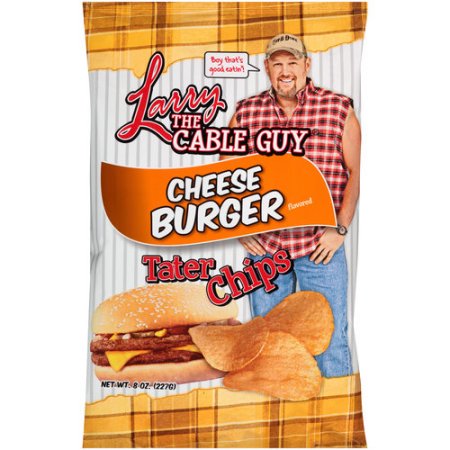
“hyuk-hyuk.”
The better man puts thought into what he wears. He gives the rest of the world the compliment of making an effort. But more importantly, he dresses for who he is, not for who he wants the world to think he is.
6) A better man is deliberate about what matters.
It was two millennia ago that Socrates, one of the first better men, said “the unexamined life isn’t worth living”, and even though it’s a great rule of thumb, it still hasn’t really caught on.
Most guys just do whatever their friends and culture do. But that’s a crappy yardstick to measure a life by.
The better man is deliberate about what matters– the choices he makes about his mate, his kids, his job. He pays attention to how he spends his money, and his time, and his energy. He measures himself not against his culture, but against excellence. And that means he’s deliberate about being self-aware. He studies his own flaws, he gauges what works best, and he uses that information to constantly fine-tune who he is, always striving to be even better.
7) A better man shows respect wherever it’s deserved.
Not just to the people and issues and causes that he instinctively reveres, but to good qualities wherever he finds them. Example: the average guy mocks and dismisses the people who vote different than him. A better man sees that those people want good things, too, they just have a different idea of how to get it. He respects their intentions, even if he doesn’t agree with their methods.

“Method, shmethod.”
8) A better man makes quiet sacrifices for others (even strangers).
Years ago, I was cutting through a mall parking lot at rush hour, following a long stream of other impatient drivers looking to shave half a minute off the commute. We all jockeyed for positions, tailgated each other, and cut each other off wherever we could. I got to one of those stupid little mall stop signs and angled to turn in front of a car coming the other direction. A woman was driving. She saw my intention, patiently stopped her car, and with a wry little smile, she waved me on in front of her.
With that tiny little sacrifice of her time, peppered with the patient bemusement in her smile, she completely shamed me.
Our culture trains us to be the most self-centered, me-first bastards imaginable. The better man knows this and goes the other way. He makes sacrifices, some big, some little, sometimes even for people he doesn’t even know. Sometimes he even sacrifices for the other self-centered, me-first bastards, and in so doing he shames them a little, just by being better than them.
9) A better man leads when leadership is welcome.
If you force authority on people who don’t want it, you’re not a leader; you’re a pissant tyrant. If you shrink from authority when it’s your duty, you’re not humble; you’re an insecure twit. The better man knows when it’s his time to lead, and he does it by being the sort of person people want to follow.
10) A better man doesn’t complain
This one’s simple. Complaining—whether it’s about your boss, or your wife, or your job, or the damn government—doesn’t make you the sober voice of truth. It makes you a whiny little wuss. The better man doesn’t bitch about his lot in life. He makes it better, or he shoulders it without complaint.
11) A better man can be wrong.
If you’ve lived your whole adult life without changing your worldview or opinion about anything important, you’re either the smartest man in the world, or you’re terrified of being wrong and have done everything you can to avoid it. Maybe you just surround yourself with people who agree with you. It’s easier now than it’s ever been.
Quit it. Being willing to be wrong means gaining ever stronger and better opinions. It inspires people to be less guarded and defensive. It makes you better in a way that surpasses mere rightness and approaches actual goodness.
People respect us for our strengths. But they relate to us for our imperfections. The better man seeks to be relatable more than to be simply right. It’s how he builds communities and friendships and, ultimately, more better men.
12) A better man respects his sex.
I don’t mean his gender. I mean his actual sexuality—his passions, his fantasies, his erotic intimacies. Let’s be totally blunt: porn may or may not be harmless (it’s not). It may or may not demean women (it does). But what we all know is this: it demeans you. Looking at two-dimensional honeys tells your subconscious brain that you’re not good enough for the real thing. And you know what? The more you do it, the more it’s true.
The better man respects his sex enough to save it for a real, live, complicated, feeling, mind-blowingly delightful woman. He doesn’t pay her for it. He doesn’t pressure her into it. He doesn’t have to. He knows he’s worth being wanted, and he works to earn her desire, without demands or expectations.
And that’s pretty much it.
Basically, we all have to quit buying into the notion of the “real” man. There’s no such thing. The “real” man is merely a checklist of superficials, written mostly by small men buried in their own insecurities. Obsessing about “real” manhood is ironically the least real way to be. Throw it out with the trash.
Instead, focus on becoming a better man. It’s a journey, not a checklist. It’s all yours. Own it.
(And maybe I’ll be able to do the same.)
The Generation of Generalization
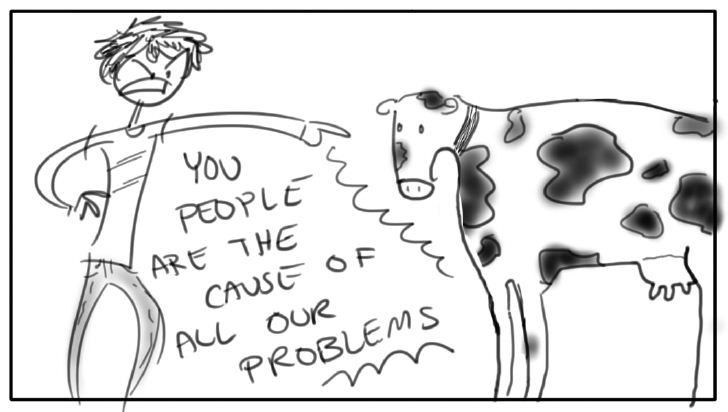 So I heard a rumor that a teacher at a local school (I’m being deliberately vague) is making broad judgments, during class, about parents and people who vote for a particular presidential candidate. We all really like this teacher, and to some extent I don’t even disagree with their opinion. And yet I am very unsettled by this.
So I heard a rumor that a teacher at a local school (I’m being deliberately vague) is making broad judgments, during class, about parents and people who vote for a particular presidential candidate. We all really like this teacher, and to some extent I don’t even disagree with their opinion. And yet I am very unsettled by this.
I’ve been asking myself why it bothers me so much.
I think it’s because it feels like updated McCarthyism.
And because, especially when it’s passed down from a teacher to students, it is a form of thought police, stifling disagreement, discouraging debate, exchanging critical thinking for mere intellectual fascism.
And because the pet error of our generation is the insistence that disagreement equals stupidity. More than that, disagreement may even represent a sort of dangerous, idiot evil that needs to be put down by force, if necessary.
We’ve all bought into it by degrees— the generation of generalization. We pride ourselves in holding two entirely contradictory ideas in our heads: “bigotry is bad” and “all X people are Y”.
It can manifest in endless ways:
All Trump voters are racist idiots.
Liberals are all intellectually-dishonest cowards.
White people ignore police brutality.
Black people riot and loot.
Christians are anti-science haters.
Nickelback listeners are tasteless rubes.
Did that last one make you smile? Does it seem OK to generalize based on musical taste? Like some generalizations are harmless?
That’s pretty sad. The ugliness of generalization– of bigotry– is fractal. It’s the same vicious shape no matter how small and seemingly harmless we reduce it.
It’s a rotten, invasive little seed of prejudice that can’t be planted in just one corner of our intellectual garden. It takes over. It taints, then becomes the entire garden, obliterating all other consideration.
We’ve grown accustomed to the idea that the easiest way to feel big is to stand on someone else. We think it’s OK, because we don’t make it a person, we make it some generalized group or demographic or voting block or sexual orientation or cultural category.
We think that judging a person is evil. But judging people– based entirely on superficial group affiliation– is just fine.
Maybe even our moral duty.
In our world, people aren’t different from us because they’ve had different life experiences that have formed alternate views and opinions.
They’re different because they’re stupid, and immoral, and dangerous. Period.
I don’t want to be misconstrued on one thing, however: People can be wrong. Their life experiences may have fostered perceptions and approaches and attitudes that may indeed be completely mistaken, inaccurate, and even destructive. But it’s the grand ego of our generation to insist, first and foremost, that difference equals stupidity. Nothing less, and absolutely, positively nothing more.
So that, I think, is what bothers me about a teacher making broad, categorical judgments about “everyone who votes for X”. Not because I like X, but because it perpetuates an ugliness that is already way too prevalent. Personally, I think this mentality— the generation of generalization, the doublethink that bigotry is only bad if it’s bigotry against the wrong people— is a much, much bigger threat to society than any presidential candidate could ever be.
How a Regular American Could Become President With One Unusual Message
 I call myself a conservative, but I’m really not that different from most of my liberal friends (of whom there are many) when it comes to the things we care about. I also identify pretty consistently with my libertarian friends as well, and can even share some common ground with my few Socialist pals.
I call myself a conservative, but I’m really not that different from most of my liberal friends (of whom there are many) when it comes to the things we care about. I also identify pretty consistently with my libertarian friends as well, and can even share some common ground with my few Socialist pals.
In every case, we can be friends and have good discussion not because we agree on how things should get done (that rarely happens) but because we do agree on why things should get done.
If I ran for president, I would probably end up on the Republican ticket, somewhere in that murky historic middle ground between Abe Lincoln and Donald Trump, and yet my strongest statement would be this:
I have more in common with the typical Democrat voter than I do with the typical Republican politician.
My message would be that I respect and share many of the concerns of the rank-and-file Democrat. And when my fellow Republicans arose in affronted surprise, I would remind them: we don’t fault our Democrat friends for caring deeply for the poor and underclass, or the environment, or those who’ve experienced unfair hurdles or discrimination in life, blocking their path to the success and liberty we all strive for. These are all worthy concerns, and we share them.
The problem is that we’ve conflated our good Democrat neighbors with the bad Democrat politicians, those who’ve exploited their constituents’ passions, and responded with bloated, flabby government programs that rarely succeed in alleviating the problem (assuming they were designed to succeed in the first place, and aren’t merely weak attempts to appease a Democrat electorate that they believe is too stupid to look past the “good intentions”).
To Democrat Americans, I would say loudly and repeatedly: you are my allies, and I am yours. What you care about matters deeply, because these are things we should all care about. We may often disagree on the how, but we will find a way, because we do agree on the why.
And to the American Democrat, I would go on: You don’t really hate your Republican neighbors the way you’ve been told to by your leaders and culture. Your leaders need you to hate, because it translates to votes and viewers. And I understand the allure of hating “the villainous other”– we all do.
Because hate often feels righteous.
And yet really, you don’t hate your Republican neighbors, whose deepest concerns are to protect the core goodness of our culture, to be free to have reverence for their faith, to respect the boundaries of personal responsibility, to fight for everyone’s freedom to choose their own path, and reap the possible rewards.
What you, my Democrat friends, rightfully hate are the bad Republican politicians who’ve exploited those causes for mere power, with little intention of assuring fairness of opportunity for everyone, who’ve catered to the lowest denominators of greed, and the tiniest, ugly percent of an otherwise wholesome constituency.
Our enemies are not each other. If I were president, I would listen to the concerns of all sides, and work as hard as possible to find workable solutions for the good causes that we all share.
We have harbored distrust and animosity for so long that it’s become a virtue of our respective camps.
And the truth is, we aren’t wrong in our distrust and animosity. We’ve simply allowed the politicians– and the media that feeds off them like a remora feeds off a shark– to turn the focus of that mistrust onto each other, instead of them.
Because let’s all face the facts: Democrat or Republican, they’ve all had decades to get this right, and all they’ve accomplished is maintaining the status quo, living off our trust like vampires, spending all their energy working to make us hate each other, distracting us from their own deliberate incompetence.
Hillary wants to be president of the Democrat half of the country. She is unabashed about this. Trump wants to be President of what remains of the Republican half of the country, bullying for them while rubbing everyone else’s noses in their loss of power and influence.
What we need is a president who is the president of everyone. Who understands and commits to the belief that the American citizen, regardless of party, has worthy concerns, and should never be punished, or ridiculed, or excluded for them.
We won’t often agree on how to do good things. But it’s time to focus first on the fact that, deep down, we, the American people, all do want good things, both for our families, and our neighbors, and our communities.
For too long we’ve submitted to politicians and the media pitting factions of American people against each other.
We have to stop defending our bad politicians as if they somehow represent us and deserve our unflagging loyalty merely for having the proper letter in front of their names.
They do not.
We all have common ground, but those who gain from division have done everything they can to hide that from us.
Because part of our common ground is that it isn’t our Democrat or Republican neighbors who are the problem. The problem is the politicians and media who’ve fed off making us believe so.
So talk to your friends from opposing perspectives. Make a point of finding the common ground, because it does exist. Avoid the all-too-easy impulse to focus on the differences in the how, to mock and belittle and argue.
Get out of the intellectual prison-camps of extremism that our politicians and culture have herded us into like the cattle they believe we are.
Let’s be united again, in purpose. Let’s be Americans first, before Democrats and Republicans.
If we can rise to a higher nature and do that, if we can remember that we agree on the why, then the how will eventually come.
If I was running for president, that would be my first and most oft-repeated message. My guiding principle. My deepest vision.
It may be naive, and the hurdle of overcoming our easy hatred and division may be so high that we cannot leap it in one election, or even one generation.
But anyone who aims for anything easier or lesser should never,ever earn our vote.
What Siri Taught Me About Understanding Existence
I consider myself a skeptic—that is, someone who examines and questions his beliefs and perceptions. And yet I’ve never felt quite comfortable in the community of Skeptics (big S).
Upon reading an article by (and about) Skeptics, I think I’ve figured out why. I’ll spoil this whole blog post by giving the answer now:
Skeptics are only skeptical of the sources they’re inclined not to trust anyway.
This is not true skepticism. In fact, it’s almost the exact opposite.
The thing Skeptics ignore is that there has to be more than one way for humans to ascertain truth about the world. The Skeptic relies exclusively on Intellect/Reason. What can be seen, measured, proved, and repeated.
This is a comfortable place to be, admittedly, because we live in a culture that reveres (perhaps even idolizes) science.
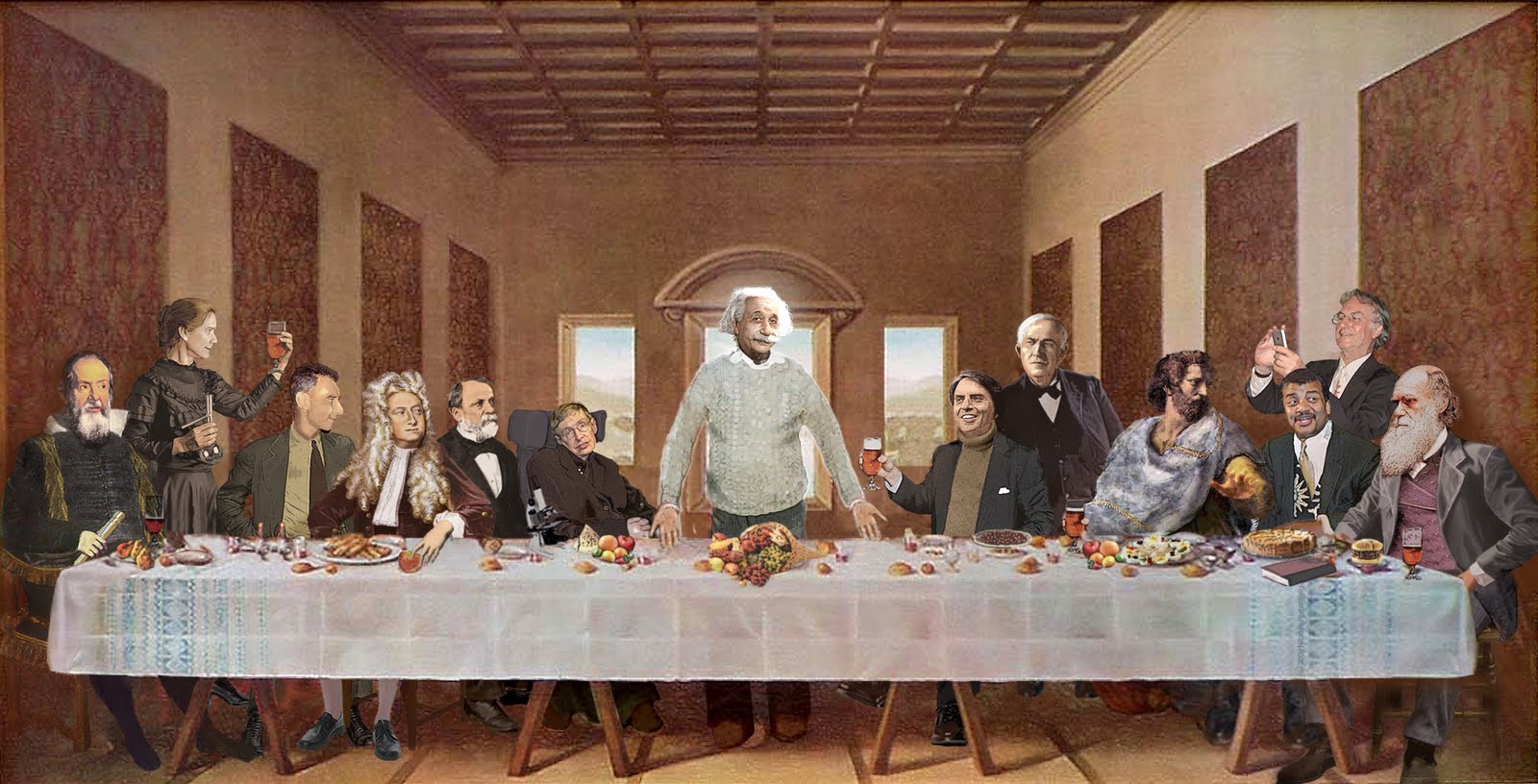
“I don’t care how many decimal places you average the check down to. Did you see how many drinks Hitchens had?”
But there must be at least two other avenues by which humans perceive the world. For the sake of simplification, let’s call them Heart/Emotion and Spirit/Revelation.
(And with that, all my Skeptic friends have already checked out. For the rest of you, hang in there.)
These three methods of understanding the world are like three techniques of getting directions to a place: satellite navigation, a paper map, and asking a bystander.
Intellect/Reason is like using satnav to get somewhere. It’s precise, bloodless, and (ostensibly) utterly objective. I myself prefer satnav. I’m happy to let my phone tell me when and where to turn. I trust the science behind it. I respect and understand, if vaguely, the reliability of satellite triangulation married to the most perfectly scanned and catalogued maps of planet earth that have ever existed in human history.
But then there’s Heart/Emotion, which is more like the paper map in the glove compartment: trustworthy in and of itself, but always subject to the interpretation of the reader. My wife prefers a paper map, something she can unfold in her hands and translate with her own brain, wedding what’s on the page to her own skills and experiences.
And finally there is Spirit/Revelation, which is most akin to stopping alongside the road and asking a stranger for directions. With this method, one is no longer relying on their own personal skill, experience, or rationality but is trusting instead on an outside source of knowledge.

“Turn right at youthful idealism, hang a louie at unresolved guilt, and just follow the signs for middle-age resentment. Easy peasy!”
Now I’ll be honest: it’s very easy to see why Skeptics ignore (and even belittle) the second two methods of understanding the world, placing all of their emphasis firmly on Intellect/Reason.
Heart/Emotion, just like a paper map, is entirely subject to the skills of the individual parsing the data. The person reading the map/feeling the emotion may be accurately responding to the input while simultaneously completely misinterpreting it. Some of the worst fights my wife and I have ever experienced have revolved around misread directions, both of the cartographic and emotional variety.
Spirit/Revelation is even easier to dismiss. This is why most men are stereotypically loath to ask directions. It’s perceived as surrender, a sign of weakness, even a defeat. Trusting an external source of revelation is not only seen as unreliable, but as an offensive abdication of one’s own competence.
Thus, I can’t exactly blame the Skeptic for ignoring everything except for Intellect/Reason. In the same way that I would be happy to never open another paper map or ask directions ever again. I love my satnav. I trust it.
And yet, embarrassingly enough, satellite navigation has failed me on more than a few occasions. It’s directed me to the center of an industrial park loading dock instead of the pizza place I was looking for. It’s missed destinations by many blocks, all while insisting I was exactly where I was supposed to be. It has sometimes tried to take me to entirely different cities. It will insist a destination doesn’t exist at all if I input the name in a way even slightly different than it understands.
In short, satnav is imperfect. Cell reception can be sketchy, the data can be input incorrectly, satellite map information can be confusing, even to a computer. (Consider, for a moment, the invisible island that Google maps insists is there.)

“Go home, Google. You’re drunk.”
Similarly, let’s be honest: Intellect/Reason can lead us astray as well, or bypass some truths altogether.
For example, back in Copernicus’ day when the debate was about the center of the universe, some scientists argued that everything revolved around the earth using very reasonable, scientific logic: parallax. They knew that if the earth was moving around the sun, the spaces between the stars would shift throughout the year as the earth changed position relative to them. Since this was not observable, science dictated that the earth was stationary.
Of course, just like with my satnav, it wasn’t the science itself that was wrong, but the tools of implementing it. The scientists of Copernicus’ day didn’t have sensitive enough equipment to measure the parallax of the stars.
The tools of Intellect/Reason are necessarily limited. There are some things they simply cannot measure or understand. Science may be able to show why hunger chemically affects the chemical balance of a human brain, but it’s no good at helping me discern if my wife is truly mad about the lawn needing mowed or if she’s just hangry.

That’s where Heart/Emotion come in.
Heart/Emotion, like reading a map, can be unreliable. But that’s only if my interpretation is clumsy. The emotion, just like the map itself, is accurate in and of itself. It’s my duty to learn how to interpret the data in a reliable and meaningful way.
And there are essential things I can learn via that study that no amount of “in a quarter mile, turn right” satnav will ever teach me. Emotional data, like a map, can illustrate the subtle topography of human interaction and the psychological distances between ideologies (and how they might loop back on one another). Emotional truth helps me understand and relate to my wife and kids and friends. It provides the mechanism of empathy, compassion, romance, and persuasion.
But what of Spirit/Revelation?
This method of learning about the world and existence is much maligned (and understandably so) because it isn’t as simple as asking a bystander how to find an address. We all know how to choose a reliable source for directions. We ask the wizened gas station jockey, not the wino on the corner or the toddler in the playground.
Unfortunately, it isn’t that simple when it comes to revelation about life and existence. Sources for revelatory knowledge can seem nebulous, numerous, and even mythical. But this may be because we are no longer trained in the art of divining (pun intended) the spiritual equivalent of the gas station expert from the homeless meth addict.
Like learning to reliably interpret emotions, learning how to test and translate knowledge obtained via Spirit/Revelation is largely a lost art, either because we think it’s silly (the Skeptic) or because we trust anything and everything (the Mystic).
But the fact that this method is the least understood and/or the most clumsily engaged is not a legitimate reason to ignore it.
Imagine if we applied the same logic to an electron microscope or a DSM manual.
The thing Skeptics love about Intellect/Reason is that knowledge gained via this manner is shareable. It can be documented and repeated.
Knowledge gained via Heart/Emotion and Spirit/Revelation is much harder to share. But this cannot mean it is less valuable or useful.
That would be like saying love is a myth because I can’t make you love what I do.
(What I love.)
So, circling back to my first paragraph: the problem with Skeptics is that they are people inclined toward one method of knowledge happily applying skepticism to the *other* methods of knowledge.
And to be fair, this is the same problem with Mystics. And Romantics.
We are all inclined to prefer one way of learning about the world over another. And we are all wired to wholly exercise that method and let the others languish.
But what if truth can only be really approached when we find a way to balance all three methods? When we find that sweet spot between Intellect, Heart, and Spirit?
What if real skepticism means using all three methods of knowledge to hone and test the others?
Let’s take it a step further: what if Intellect, Heart, and Spirit are a little like Rock, Paper, and Scissors? Each with their own individual strength and weakness, but undefeatable as a trio? What if our ability to approach truth is only really honed when we are capable of engaging any of those three options, each tempered and bolstered by the other?
This is possibly where modern society falls down the hardest—the thing that future cultures will most laugh at and lament about us. From Neil Degrasse Tyson to Bill Nye, to “I Fucking Love Science”, we’re so in love with the smug superiority of Intellect that we’ve become abject puny weaklings when it comes to Heart and Spirit.
We’ve removed all but one tool from our toolbox of knowledge.
We throw the same hand every time we play Rock, Paper, Scissors.
And no matter how superior we may feel about it, we’re the worse for it.
So to end this on an upshot, let’s practice with another tool. Next time you want to throw Rock, try Paper. Next time you want to dismiss a belief because it hearkens to a source of knowledge you dismiss, consider it anyway. Next time you agree with something because it corresponds to your preferred tool for understanding the world, be skeptical. Test it against another way of divining truth.
I dare you.
Challenge yourself. Practice the far more difficult skills of interpreting your Heart and Spirit. Get uncomfortable with some new ideas. Instead of poking at other people’s stupid beliefs, try to find the stupidity in your own.
Because no matter what, it’s there.
Oh man, is it ever.
Just like with mine.
At the intersection of heart, mind, and spirit, maybe just once…
try ignoring your satnav.
10 Differences if “Downton Abbey” had been made for American television
I know I am several years late to this party, but I’ve only recently discovered Downton Abbey. I had no idea of its power, otherwise I never would have approached the event horizon of its attention-absorbing black hole. As it is, my wife and I are irreversibly sucked in. We shall be spat out only when we run out of episodes on Amazon Prime or the brilliant BBC wonks stop producing it. Curse those amazing Brits and their fantastic casting, self-loathing rapier wit, and unimpeachable writing!
But it got me wondering: what would Downton Abbey have been like if it had been produced by Americans, for American TV? I’m pretty sure the following list sums it up.
—————-
10. Bates murders Thomas in the first season, accompanied by a pithy one-liner (“somebody’s going DOWN in Downton…”). He then develops a taste for vigilantism and goes to London in search of Jack the Ripper.

“… and after that, it’s that Carmen San Diego broad…”
9. Lady Edith is slowly transformed into the unpredictable Kramer-esque breakout character with an over-used, buzz-worthy catchphrase: “Mary! Kiss my kippers!” [laugh track]

“I received a letter today from cousin Urkel…”
8. Sarah O’Brien is revealed to be distantly related to Nelly Olsen from “Little House on the Prairie”. There is a crossover episode.

(Why Mary is blind and Cousin Albert gets on Drugs)
7. Dabney Coleman plays “OverLord Grantham”, a vicious, abusive industrialist making gilded-age wealth on the backs of child labor and gleeful pollution. His nemesis is an inexplicable environmental rights solicitor played by Kate Winslet.

“Carson, when will the orphans be served? For dinner?” [evil cackle]
6. They have a torrid love/hate affair in the third season.

“Slightly better than floating on a headboard in the Atlantic.”
5. Matthew Crawley uses the family fortune to build “Titanic Too, the Sequel”. He accompanies it on its maiden voyage and is shipwrecked on an Island. There, he builds a weird hatch and a button with a timer attached to it. He has a polar bear for some reason.

[sniff] “Smells like new money.”
4. Carson the Butler spends his free time solving murders in nearby villages with the help of his sidekick, a cockney street urchin played by Jaden Smith. During season four, they briefly leave Downton Abbey to attempt their own spin-off series called “Carson and the Kid”.

“Pray, inform the constable that we have located Lord Mustard’s candlestick. It was in the Library.”
3. The entirety of season five is a self-contained story arc in which aliens invade Downton intent on abducting Lady Mary as their queen. Her parents are ecstatic about this plan, but Mary screws it up somehow by being horrible. Aunt Rosamund is revealed to be a giant praying mantis wearing a human suit. The aliens wipe everyone’s memories and leave, thus nullifying the entire season.

“Those aren’t feathers. They’re my antennae.”
2. In season six, Daisy the scullery maid witnesses the Dowager Countess using a magic wand to turn a teacup into a frog. She doesn’t tell anyone, but suddenly starts wearing a burgundy-and-gold knitted scarf and calling the family “My Muggle Lord and lady”. The Countess pays for Daisy’s silence with Leprechaun gold.

“Have the chauffeur drop her off in Knockturn Alley.”
1. In the final season, the entire family moves to Dallas, Texas and gets into the oil business. Cora miraculously gets pregnant with a son, whom they name “John Ross”. Downstairs, everyone starts calling him “J. R.”.

[sniff] “Smells like old money.”
I’m Rock, You’re Water (A Love Story/Fable/Social Commentary)

Rock and Water had a complex relationship from the start…
Water spent most of her time running along streams and rivers, tossing waves around her oceans, occasionally getting into hurricane rages about this or that, and often pouring herself out as life-giving rain over the land.
Rock spent most of his time sitting perfectly still and doing not much of anything except being heavy and hard, thereby providing the backbone for everything from mountains to molehills, from garages to castles.
Rock and Water couldn’t be any more different, and yet they both tended to respect each other, being equal parts of the world, and being equally necessary and worthwhile, albeit in extremely different ways.
Of course, unsurprisingly, sometimes their mutual respect turned sour. Sometimes Water got into Rock’s cracks and froze and broke him apart. “I spent two hundred million years getting into that shape!” he would exclaim.
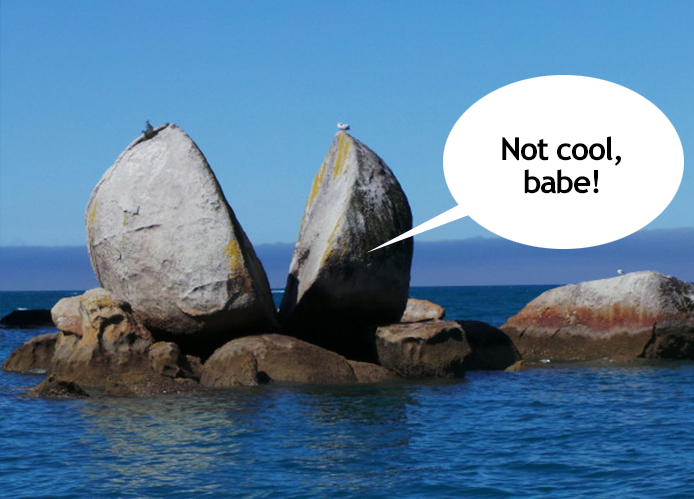
And sometimes Rock was made into a dam that blocked the flow of Water’s rivers. “Just because you’re happy to lie around all day, do you have to stop me from moving!?” she’d shout at him. “Just look at my tributaries! They’re getting all fat!”
And sometimes there were deep jealousies between them.
One day, while Rock was contenting himself as a giant boulder on a hill, he watched how Water cascaded wildly down a nearby cliff-face, crashing into a deep pool below and roaring with laughter all the way.

He mustered every ounce of his complicated stony geology and melted himself into lava, committed to joining Water. Hissing and burning everything in sight, he delighted in his molten form, convinced that Water would be impressed at just how liquidy he could be.
Unfortunately, as soon as he joined Water on the cliff-face, she erupted into angry steam. “Get away! You’ll ruin everything, you big stupid clod!”
“Fine! Be that way!” Rock sulked, and solidified again, blocking the water flow. The few chunks of stone that did make it over the cliff looked pathetic as they tumbled like bricks, making ugly splashes in the pool below and sinking straight to the darkness of the bottom.
A few millennia later, Water felt some jealousy of her own. Rock was always being made into amazing things, from mountains to mansions. “I can be just as constructive as him,” she challenged herself.

Summoning all of her hydro-dynamic energy, she solidified into a lake of solid ice. Inspired, some humans turned away from the Rock, choosing instead to cut Water’s ice into huge blocks for building. They constructed a hotel out of her and lit her with hundreds of lights. She looked positively ethereal, shining in the snow like a crystalline castle. “Rock never looked as good as this,” she said smugly. “I can be hard and beautiful.”
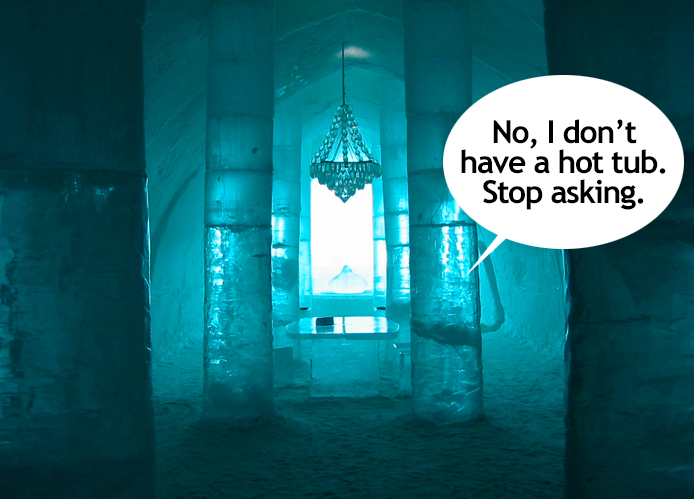
And yet, despite her beauty and hardness, the humans who came to visit never stayed long. They exclaimed about her beauty, but complained about her coldness. And soon enough, the seasons changed and no matter how hard Water tried, she couldn’t maintain her solidness. She melted away with a deep, angry sigh of weariness.
Rock laughed a little smugly, knowing that the things built from him lasted thousands and even millions of years.
A different time, Rock tried to assume a majestic expanse like Water’s oceans, turning himself into a massive desert. It had waves, just like the ocean, but they were much harder and slower.

No one sailed boats on Rock’s sandy waves. The humans mostly avoided the desert ocean. Virtually nothing lived there. Rock sighed angrily, knowing that his plan had failed, but being Rock, just left his desert lying there anyway.
Water saw how richly moss grew on Rock’s boulders and mountains, carpeting them with lush green. She tried to lay still long enough to grow some moss of her own, but hers was a stagnant scum that stank and stifled her depths. Within a few decades, she threw the moss off and started running again in disgust.

And yet still, Rock saw how Water frolicked on the beaches, and he longed deeply to join her. He watched the majesty of her hurricanes and respected her. He felt her give herself to the land as rain, and he yearned for her.
“She’s more regal and beautiful and dynamic than I can ever hope to be,” he told himself.
Water, for her part, looked up at Rock’s imposing mountains and admired him. She saw the things built from him and respected him. She saw his steadfast reliability in the face of constant changing seasons and pined for him.
“He’s more solid and unscalable and immutable than I will ever be,” she sighed in her deepest heart.
Silently, they loved each other. They were equal in importance, in beauty, in strength. And yet, the more they tried to express their mutual admiration and affection by trying to be like the other, the further they pushed apart.
Water, when she tried to become Rock, was brittle and cold. Rock, when he tried to become Water, was destructive and searing.

Time went by. The years drifted into millennia. And then, slowly, a realization began to dawn on each of them, separately but similarly.
They were drawn to each because of their differences. And they were both only the best of themselves when they embraced those things that made them so different.
And further, they realized that it was when they were both completely themselves that they complemented each other and loved each other best.
Water could not frolic on the beach without the reliable bed of Rock’s sands. She could not cascade into waterfalls without the comforting strength of Rock’s cliffs.
And Rock could not be carved into his most impressive canyons over the centuries without water’s gentle, dynamic influence. His beauty was the shadow of hers, molded imperceptibly over time, made soft in the only way that he could be, by constant, gentle pressure.
Amazingly, both Rock and Water came to the same epiphany at the same time: they were only able to be their best selves when they allowed their other to be as different from them as they were made to be.
Water still resented Rock’s stubbornness. And Rock still chafed at Water’s persistent flowing energy. But with patience and an occasional eye-roll, they settled down together. They loved each other for their immense, necessary differences, not as bad imitations of themselves, but as their equal and opposite.
Rock scattered himself as boulders and stepping stones and rocky beds along the many miles of Water’s favorite, most curvaceous river. Together, they made rapids and shallows, circling pools and swift cascades, waterfalls and babbling currents. She laughed all day under the influence of his immobile solidity, and he softened over the years, his boulders losing their craggy viciousness and his stones becoming smooth as pillows, glittering under Water’s crystalline embrace.

They were utterly different, and sometimes they still drove each other crazy. But they were the best themselves when they were together. They knew this, and reveled in it.
And it only took a little over four billion years.









